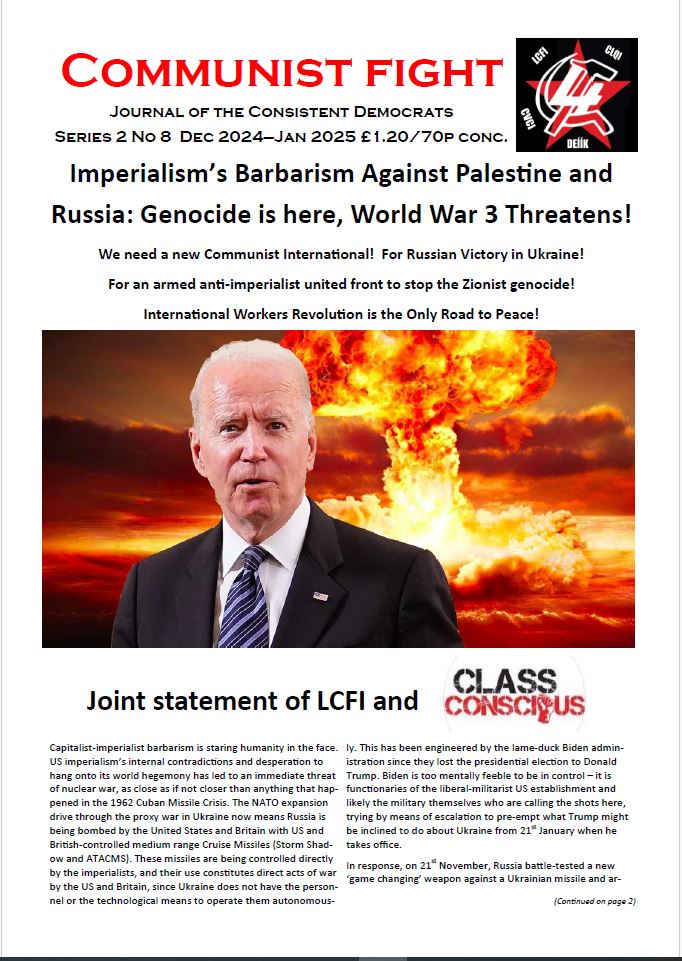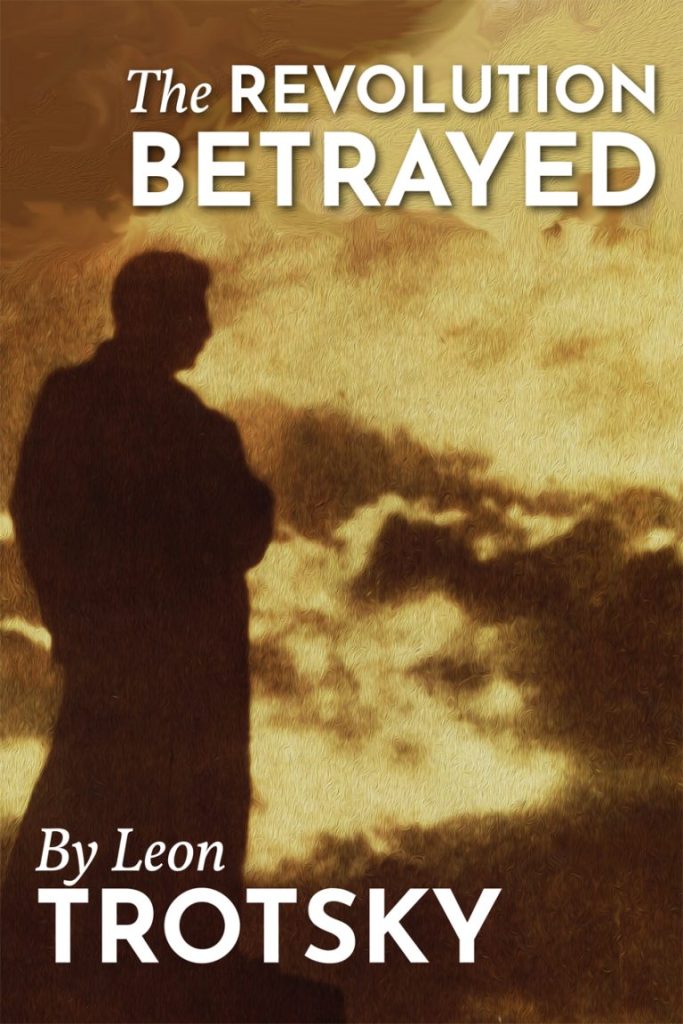
The notes for this presentation (5th January) are now available to read, and the presentation and discussion are also available to listen to as a podcast.
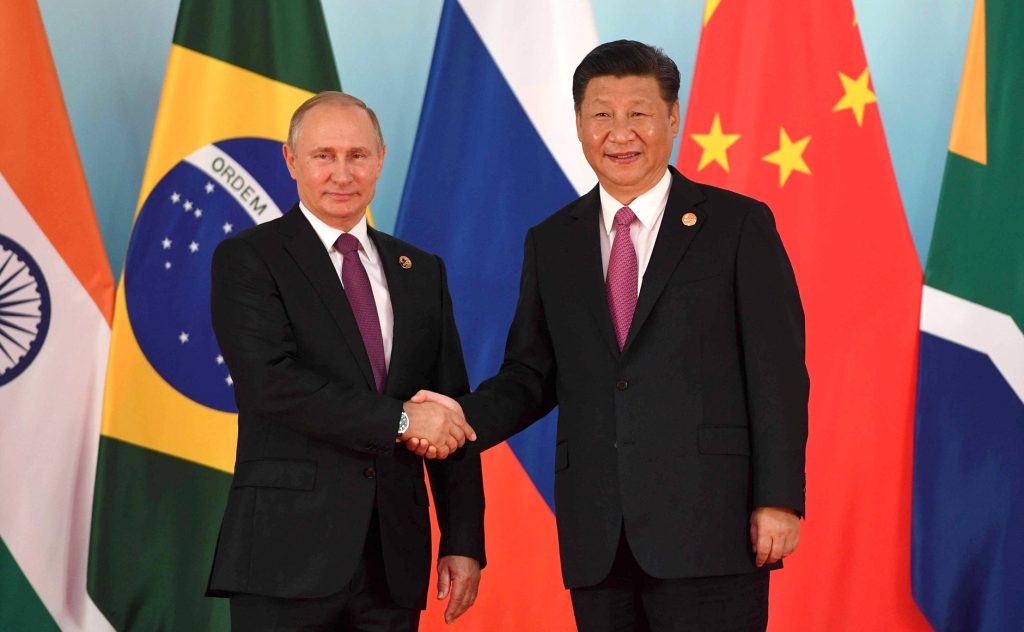
This presentation, by a Consistent Democrats speaker, and the discussion that followed it, is available as a podcast also.
This talk focuses on the nature of Russia and China today. It is based on the LCFI’s statement “Marxism and the Post-Counterrevolution Cold War” from just over a year ago. This is the beginning of the subject. We undoubtedly need more discussions to deal with the world situation today, and the road to world revolution. These are huge issues. We are living through a new historical period
The imperialist powers of European origin (with the sole exception of Japan), the monopoly capitalist powers that have enriched themselves and dominated the greater part of the globe, for approximately 150 years, have gone into the greatest crisis in their history. And what is remarkable is that this crisis is manifesting itself only 30 years or so after imperialist capitalism had achieved what seemed to be its greatest triumph. In 1991 the Soviet Union collapsed, and the former multinational degenerated workers state fragmented along national lines.
In Russia, its central component, a government came to power led by Boris Yeltsin, the former chief of the Moscow Communist Party, who had metamorphosed into first a populist demagogue, and then an advocate of the restoration of capitalist through a massive, rapid economic shock. The marketising regime of Mikhail Gorbachev, which whittled away at central planning in the name of perestroika (reconstruction) and which did away with the repression of the Stalinist regime in the name of glasnost (openness), acted a transitional ‘bridge’ to the rise of Yeltsin and the counterrevolution. This Yeltsin catastrophe happened less than two years after Gorbachev opened the Berlin wall, which resulted in the coming to power of capitalist restorationist regimes, liquidating the deformed workers states of Eastern Europe, with Poland under the pro-capitalist trade union, Solidarność, as the vanguard.
Parallel with this we had the rise of capitalism in China. Even though the Communist Party remained in power, since 1979 and the rise to power of Deng Xiaoping as leader of the party, a kind of pro-capitalist ideologue as well as being a ‘Communist’ bureaucrat. His regime broke the ‘iron rice bowl’, the system of collective welfare that was the foundation of the Chinese deformed workers state under Mao since the 1949 revolution. The watchword of Deng was ‘to get rich is glorious’: marketisation in China accelerated more quickly in China than in the USSR throughout the 1980s. Though the final breakthrough for capitalist restoration was controlled by the bureaucracy from above, not through a shock treatment directed at the bureaucracy externally, as in Russia. But through a massive intensification of marketisation/privatisation promoted by Deng on his Southern Tour in late 1992, which beat back the backlash within the bureaucracy against marketisation that occurred after Tien-An-Mien Square in 1989, and represented a qualitative turning point. So that is the initial background of the counterrevolutions in the main deformed workers states.
So, this educational is about the character of Russia and China today. Everyone above a certain age remembers the Cold War, most likely Cold War II, the warmongering crusade against Communism and the USSR led by Ronald Reagan. The hysterical, warmongering response to the Soviet intervention in Afghanistan in December 1979 is part of what won me to Trotskyism. The West provoked the Soviet intervention by funding and arming counterrevolutionary forces against a reforming government, the People’s Democratic Party of Afghanistan. The warmongering hysteria today over Russia’s SMO in Ukraine is certainly reminiscent of the Carter-Reagan warmongering over Afghanistan, as is their support of far-right extremist forces.
Similarly, what in the Ukraine, Georgia, or Hong Kong context are today called ‘colour revolutions’ – orchestrated and well-funded mass coup movements that are intended to overthrow governments – even elected ones – that the west disapproves of. These are somewhat familiar from the 1980s when the West funded counterrevolutionary movements in Eastern Europe – Polish Solidarność was the best-known example. A movement of workers, to be sure. But unlike the situation in the 1950s, when Hungarian and Polish workers rose up and demanded democratised workers states and workers control, in 1980 onwards Solidarność rapidly consolidated around a pro-capitalist, neoliberal programme. Such movements are familiar today, as are what they lead to.
What needs explaining is that capitalism, of a sort, is now dominant in the main former workers states, i.e. Russia, which does not claim to be socialist. And China, (whose Communist Party General Secretary Xi Jinping, is actually a dollar billionaire, with $1.2 billion according to Forbes). That is the legacy of the counterrevolutions of 1989-92. And yet the warmongering, crusade in Western countries against Russia and China is just as intense as it was in the Cold War of the 1980s, and for those old enough to remember, the Cold War of the 1950s also. Why is this?
It is because capitalist restoration has not proved as straightforward as the ideologues of Western imperialism made out in 1989, as exemplified by Francis Fukuyama and his essay “the End of History”. Marx’s vision was that human society would end its series of social transformations and revolutions, from primitive communism, which fell when humanity divided into classes, through slave- based production, then feudalism, through capitalism, to the final abolition of classes and the creation of developed communism. Fukuyama’s fatuous version had liberal imperialist capitalism in that role. A monstrous form of exploitation, not only of the working class in the advanced countries, but robbery of the bulk of humanity in the oppressed Global South, to extract the wealth that fuels the privileged position of the imperialist countries. Fukuyama’s vision was a complete insult to the bulk of humanity.
And to the population of the former USSR, particularly the population of Russia, who as part of this ‘end of history’ nonsense, were subject to a Pinochet-like neoliberal economic shock under Yeltsin that caused deaths by starvation, and suicide in the face of starvation, to Russian workers. This caused a fall in life expectancy of over 5 years in the early-mid 1990s, which can only be explained by millions of premature deaths. This resulted in a massive popular backlash from below. Which the Russian state responded to, giving rise to Putin’s who has become hated by imperialism because of his reversal of many of Yeltsin’ attacks. He is hated for this, not for ‘authoritarianism’. Similar things happened in China also, which also managed to make use of Western outsourcing to build itself industrially, using its state apparatus – derived from decades when it was a workers’ state. And has become the world’s industrial powerhouse.
We have been studying Leon Trotsky’s The Revolution Betrayed. We will not repeat here Trotsky’s analysis of the reasons for the rise of the bureaucratic caste in the USSR in in 1920s and 30s. Neither will we analyse the Chinese revolution of 1949, except to note that the workers state it created was not in the image of the early Soviet state of Lenin and Trotsky, literally a state of democratic workers councils, but rather one like Stalin’s USSR where the working class was deprived of power by kind of labour bureaucracy, right from the start. It was a sort of clone of Stalin’s USSR, not Lenin and Trotsky’s.
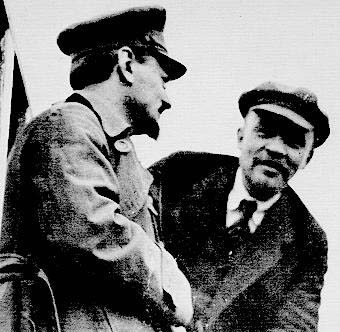
Trotsky foresaw that the bureaucratisation of the Soviet Union would lead to capitalist restoration. He was proved right, though not in his own lifetime. His warnings only came to pass decades after his death. Nevertheless, he was compelled to sketch out some basic features of such a counterrevolution. He wrote an important essay in 1937 titled: Not a workers’ and not a bourgeois state. I will quote some passages which shed light on what he considered likely:
“The proletariat of the USSR is the ruling class in a backward country where there is still a lack of the most vital necessities of life. The proletariat of the USSR rules in a land consisting of only one-twelfth part of humanity; imperialism rules over the remaining eleven-twelfths. The rule of the proletariat, already maimed by the backwardness and poverty of the country, is doubly and triply deformed under the pressure of world imperialism. The organ of the rule of the proletariat – the state – becomes an organ for pressure from imperialism (diplomacy, army, foreign trade, ideas, and customs). The struggle for domination, considered on a historical scale, is not between the proletariat and the bureaucracy, but between the proletariat and the world bourgeoisie… For the bourgeoisie – fascist as well as democratic – isolated counter-revolutionary exploits … do not suffice; it needs a complete counter-revolution in the relations of property and the opening of the Russian market. So long as this is not the case, the bourgeoisie considers the Soviet state hostile to it. And it is right.
“The internal regime in the colonial and semicolonial countries has a predominantly bourgeois character. But the pressure of foreign imperialism so alters and distorts the economic and political structure of these countries that the national bourgeoisie (even in the politically independent countries of South America) only partly reaches the height of a ruling class. The pressure of imperialism on backward countries does not, it is true, change their basic social character since the oppressor and oppressed represent only different levels of development in one and the same bourgeois society. Nevertheless the difference between England and India, Japan and China, the United States and Mexico is so big that we strictly differentiate between oppressor and oppressed bourgeois countries and we consider it our duty to support the latter against the former. The bourgeoisie of colonial and semi-colonial countries is a semi-ruling, semi-oppressed class.
“The pressure of imperialism on the Soviet Union has as its aim the alteration of the very nature of Soviet society… By this token the rule of the proletariat assumes an abridged, curbed, distorted character. One can with full justification say that the proletariat, ruling in one backward and isolated country, still remains an oppressed class. The source of oppression is world imperialism; the mechanism of transmission of the oppression – the bureaucracy. If in the words ‘a ruling and at the same time an oppressed class’ there is a contradiction, then it flows not from the mistakes of thought but from the contradiction in the very situation in the USSR. It is precisely because of this that we reject the theory of socialism in one country.”
This juxtaposition of the situation of the semi-colonial capitalist ruling classes, with that of the proletariat in power in a backward and isolated workers state, is highly suggestive of what Trotsky considered likely to happen in a counterrevolution. In a situation where the proletariat in power was oppressed by imperialist encirclement and backwardness, any bourgeois regime that were to replace it would face the same material conditions, and would likewise be a “semi-ruling, semi-oppressed class”, subject to imperialism.
Trotsky also had some useful observations about the course of counterrevolution, actual and likely, in the context of both the French (bourgeois) and Russian (proletarian) revolutions in an earlier (1935) piece, The Workers State, Thermidor and Bonapartism. Talking directly about the French revolution, he wrote:
“After the profound democratic revolution, which liberates the peasants from serfdom and gives them land, the feudal counterrevolution is generally impossible. The overthrown monarchy may reestablish itself in power and surround itself with medieval phantoms. But it is already powerless to reestablish the economy of feudalism. Once liberated from the fetters of feudalism, bourgeois relations develop automatically. They can be checked by no external force; they must themselves dig their own grave, having previously created their own gravedigger.”
He contrasted that with what would be likely in the event of the collapse of the Stalinist regime and the Russian revolution with it:
“It is altogether otherwise with the development of socialist relations. The proletarian revolution not only frees the productive forces from the fetters of private ownership but also transfers them to the direct disposal of the state that it itself creates. While the bourgeois state, after the revolution, confines itself to a police role, leaving the market to its own laws, the workers’ state assumes the direct role of economist and organizer. The replacement of one political regime by another exerts only an indirect and superficial influence upon market economy. On the contrary, the replacement of a workers’ government by a bourgeois or petty-bourgeois government would inevitably lead to the liquidation of the planned beginnings and, subsequently, to the restoration of private property. In contradistinction to capitalism, socialism is built not automatically but consciously…”
“October 1917 completed the democratic revolution and initiated the socialist revolution. No force in the world can turn back the agrarian-democratic overturn in Russia; in this we have a complete analogy with the Jacobin revolution. But a kolkhoz overturn is a threat that retains its full force, and with it is threatened the nationalization of the means of production. Political counterrevolution, even were it to recede back to the Romanov dynasty, could not reestablish feudal ownership of land. But the restoration to power of a Menshevik and Social Revolutionary bloc would suffice to obliterate the socialist construction.”
But what happened is more complex. We have had something like “the replacement of a workers’ government by a bourgeois or petty-bourgeois government … ” and “….the restoration of private property” in Russia since the 1991 collapse of the USSR. In China, we have had policies carried out for decades that Trotsky considered would lead to the rapid collapse of the Soviet Union into a kulak-led counterrevolution in the late 1920s. By the standards of the struggle of the Left Opposition against the Stalin-Bukharin bloc and its Neo-NEP – it is inconceivable that the regime of the Chinese Communist Party, with its numerous billionaire capitalists whose influence penetrates to the very top of the CCP regime, could be described today as a workers’ state.
And yet far from stabilising world capitalism under the rule of the imperialist bourgeoisie, we now have a considerable level of unity in defensive struggle of the two giant former workers states of Russia and China, against US/led NATO imperialism, which grows more and more hysterical every day. Why is this? We would reply that as with anticipations and theorisations by Marxists of what might happen if a workers revolution triumphed in a backward country, the theorisations of what would happen if such revolutions were subsequently defeated, by even the best Marxist theoreticians including Trotsky, have proven inadequate.
Trotsky was correct to say, of the bourgeois revolution, that “once liberated from the fetters of feudalism, bourgeois relations develop automatically”. However, that does not transfer to a situation where it is not feudalism that is overthrown by capitalism, but a workers’ state based on socialised property. When degenerated and deformed workers states have been overthrown by pro-capitalist forces, it has not been the case, unlike with feudalism, that “bourgeois relations develop automatically”. What we have seen is that these “bourgeois relations” have been problematic and given rise to forms of society that the imperialist bourgeoisie does not trust. States have emerged that contain enough modifications of those features of capitalism as a system that the imperialists consider vital and non-negotiable, that the same imperialists fear that these societies could flip back to some sort of socialist construction.
Perhaps like 19th Century France did to bourgeois-revolutionary upheavals after the defeat of Napoleon, with its supplementary revolutions in 1830, 1848 – which convulsed the whole of Europe – and 1871 – which gave rise to the Paris Commune, the first attempt in history to create a workers’ state.
What has come into existence in those workers states where indigenous social revolutions were once victorious and defeated many decades later, are capitalist states, but ones where capitalist relations are modified and ‘deformed’ in significant ways, and those states do not function either as imperialist states, or as semi-colonial vassal states. Neither Russia nor China fit into either category. Nor do they occupy any intermediate category between the two – they are qualitatively different from both. This is very different to passively produced ‘satellite states’ like most in East Europe, which have generally become satellites/vassals of Western imperialism.
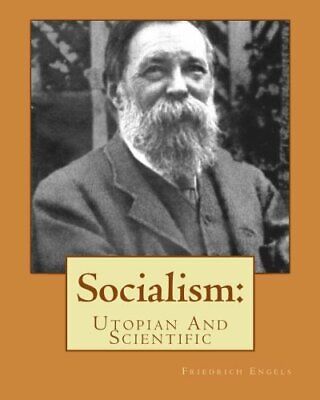
What is at the root of this? One hint of an answer can be found in a formulation in Engels’ 1880 work Socialism Utopian and Scientific, where he makes the following point about the tendency of capitalism towards the generation of trusts and monopolies:
“In the trusts, freedom of competition changes into its very opposite — into monopoly; and the production without any definite plan of capitalistic society capitulates to the production upon a definite plan of the invading socialistic society. Certainly, this is so far still to the benefit and advantage of the capitalists. But, in this case, the exploitation is so palpable, that it must break down. No nation will put up with production conducted by trusts, with so barefaced an exploitation of the community by a small band of dividend-mongers.”
This formulation, about the ‘invading socialistic society”, stems from the basic idea of Marxism, held in common by Marx and Engels, that “socialism” or “communism” which they considered as two manifestations of the same thing (‘lower’ and ‘higher’) represented a superior mode of production to capitalism. As Marx wrote in Capital:
“Development of the productive forces of social labour is the historic task and justification of capital. This is just the way in which it unconsciously creates the material requirements of a higher mode of production.”
Much of Trotsky’s polemic against the Stalinists in the 20s and 30s was against the theory of socialism in one country, the notion that it was possible to build a complete socialist mode of production in a society qualitatively more backward than the far stronger capitalist-imperialist powers that encircled it. That critique retains its full relevance and potency. But then again, Trotsky also noted that despite this, the reactionary course of the Stalinist regime “… has not yet touched the economic foundations of the state created by the revolution which, despite all the deformation and distortion, assure an unprecedented development of the productive forces.” (Once Again: The USSR and Its Defence)
Engels considered that the socialist mode of production, which was completely in the future in 1880 when he wrote Socialism: Utopian and Scientific, had the ability to ‘invade’ contemporary capitalism, and as a kind of unconscious expression of the historical process, affect the development of the same capitalism to (in some ways) anticipate future developments that would come to fruition under a higher mode of production. This is only an expression of the basic Marxist concept that Socialism: Utopian and Scientific expresses — the objective tendency of social development toward socialism. The point being that the process of capitalist restoration, the destruction of a long-established workers state, cannot be ‘automatic’ in the manner in which capitalism is able to do away with feudalism.
The existence of a workers’ state, however deformed or degenerated, means that that state has already begun the transition to a higher mode of production, communism. Even if the transition is blocked by social backwardness, imperialist encirclement and the monopoly of power of a bureaucracy that opposes and attempts to sabotage the world revolution and thereby the completion of the transition, the transition has begun. The train has left the station, even if it is stalled only a few hundred yards down a track that is many miles long. It is extremely heavy, and still very difficult to simply drag back to its starting point and beyond.
Therefore, what we have in both Russia and China are new social formations where the capitalist mode of production managed to defeat the social formation of the previous transition process, but, however, is forced to coexist in this phase with elements of an “invading socialistic society” that profoundly change those societies. Previous revolutionary processes initiated some kind of transition to the communist mode of production. These processes did not develop in the form of a linear evolution, they were interrupted and sabotaged by the siege of capitalism, imperialism and the internal contradictions originating from this siege.
Within a social formation, more than one mode of production can coexist, in an unequal and combined way. In this case, the post-capitalist mode of production coexists with ‘elements’ (of a “invading socialistic society”) of deformed proletarian dictatorships, which are, at the same time, the germ of a future socialist mode of production. It is important to remember, that in much of the semi-colonial world, capitalism coexists with a pre-capitalist heritage. That is the basis of the whole rich programmatic heritage of Permanent Revolution. Now in China and Russia various forms of capitalism coexist with a post-capitalist heritage.
There is a classic, dialectical quality in the reality that the outcome of the counterrevolution that destroyed deformed workers’ states, is a form of capitalist state that itself embodies major deformations and modifications that stem from their decades without capitalism, to the extent that imperialism perceives them as a major threat to their rule and their hegemony.
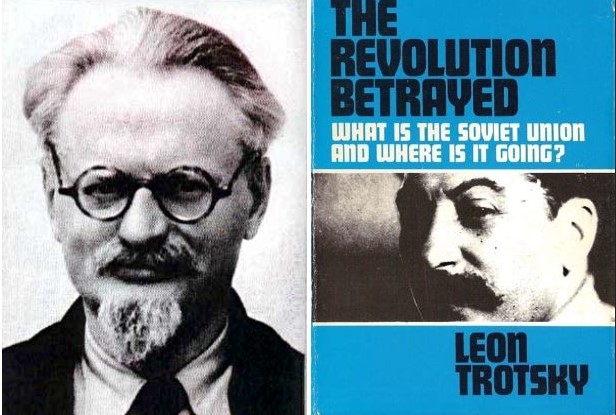
The notes for this presentation (20th October) are now available to read, and the presentation and discussion are also available to listen to as a podcast.
Dear ICL comrades,
As an orthodox Trotskyist-Communist tendency ourselves, we have watched with interest the political evolution of the International Communist League (Fourth Internationalist) since the death of James Robertson. We note that some recent changes in your political positions have brought us somewhat closer together on some key questions of the international class struggle. At the same time, we consider some important positions of yours to be mistaken, and that ironically could be seen as a retreat from positions we have come to conclude the flawed Spartacists were substantially correct about, though details of the way they put those positions forward were often seriously flawed.
We will deal with both the positive elements of your evolution and those positions we consider to be flawed. Unlike the old Spartacists, we do not consider that there is really any straight-line manifestation of ‘revolutionary continuity.’ We aspire to be the most faithful to the spirit of Marxist orthodoxy not out of any spurious loyalty to a concept of inherited wisdom, but because we consider that the materialist method of political analysis that is characteristic of Marxism, consistently employed and elaborated, produces the best analyses and programmatic positions that follow from those positions.
We reject the voluntarist and implicitly idealist notion of Robertson that “programme generates theory” which begs the question “and what generates programme?” In our view correct programmatic positions are generated by a correct materialist analysis and understanding of the world, and the crude aphorism of Robertson was at odds with that. However, what may be true is that a current with a history of correct analysis might be able to compensate for a temporarily inadequate understanding of new events by drawing on such political capital from the past, by taking a position based on a partial understanding bolstered by experience and making good its analysis later. That might be possible in some circumstances. Lenin’s building a revolutionary party based on a partially flawed theory (the “Democratic Dictatorship” – see later) is an illustrious example. But Robertson appears to have elevated such occurrences into a fetish of self-praise, that was part of the development of a political cult based on his own allegedly superior understanding and a supposed ‘revolutionary continuity’.
We do not claim, and cannot claim, to have been uniquely correct all along. That would be completely idealist and un-Marxist. We all have political histories, some of which are in a variety of flawed trends including the Robertson-led Spartacists. What we do claim is that we have studied extensively the world we are active politically in and have done our level best to become the best defenders of all past gains of workers and the oppressed, on the basis of Trotsky’s well- known statement that “It is the duty of revolutionists to defend every conquest of the working class even though it may be distorted by the pressure of hostile forces. Those who cannot defend old positions will never conquer new ones” (Balance Sheet of the Finnish Events, 1939).
The most detailed elaboration of our programmatic positions and approach is in our draft programme, which was produced in 2020 and 2021, in the main. You can get a fairly full picture of our positions from examining this, which is at https://www.consistent-democrats.org/lcfi-draft-programme/. One important supplementary document of ours, which contains a major advance in terms of understanding of the current geopolitical conflict of the West with Russia and China, is to be found here: https://www.consistent-democrats.org/uncategorized/lcfi-statement-marxism-and-the-post-counterrevolution-cold-war/. We note that there are considerable differences between us on the nature of both Russia and China. We do consider that our analysis is more truly orthodox in Marxist, Trotskyist terms than the positions which you currently uphold. We will address this later in this letter.
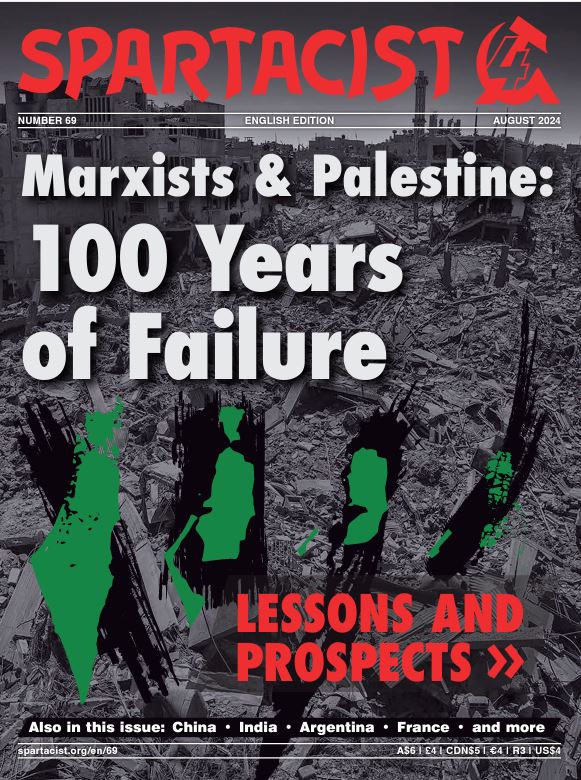
We consider that three closely related and comparatively recent changes in your positions are very positive. Firstly, your retrospective change of position on the 1948 Arab-Israeli war, which in fact was inseparable from the Nakba, the ethnic cleansing of Palestine, and necessitated taking the side of the Palestinian people resisting it, as well as those forces from neighbouring Arab countries resisting Israel’s creation through this enormous crime. These forces were both official (the forces of Syria, Egypt, then-Transjordan, Lebanon and Iraq), and unofficial (the Egyptian Muslim Brotherhood, who as documented by Ilan Pappe in his The Ethnic Cleansing of Palestine, sent in volunteers to Palestine to help the Palestinian people resist the ethnic cleansing on the ground). We profoundly agree with your change of position on this and embrace of a position on the entire Israeli-Arab conflict that the resistance of the Arab peoples to Zionist colonisation was a correct and progressive struggle, that Marxists were obliged to support as a matter of principle all along.
Secondly, we also agree with your criticism of James Robertson’s Shachtmanite heritage, which was not some long-overcome aspect of his political history, but an active political flaw that fundamentally distorted the proclaimed Trotskyist orthodoxy of the Spartacist tendency for the whole of its existence. Our draft programme notes the following about the Spartacists:
“The Revolutionary Tendency of the SWP became the Spartacist League of the US, which founded its own anti-revisionist tendency internationally beginning in 1966, though for several years it had to struggle against involuntary national isolation due to being bureaucratically excluded from the ‘anti-revisionist’ IC. Though they analysed the Cuban revolution correctly, concluding that Castro had established a deformed workers state, they had other fundamental political problems in their history and background which they failed to properly address.
For instance, the origins of their leading cadre: Robertson, Wohlforth and Mage, were in the Shachtmanite ‘Third Camp’ Workers Party (WP), later Independent Socialist League (ISL) in the 1940s and 1950s. They split to the left from the ISL in the aftermath of the 1956 Hungarian Revolution and embraced a Soviet defencist position that was obviously basically correct. But they never completely broke with another facet of the Shachtmanites’ politics, their pro-Zionism, support for Israel and softness on the nationalism of oppressor peoples in some important conflicts involving settler peoples in conflict with indigenous peoples who the colonists had subjugated and/or driven out.
A year or so after the Spartacist League/US was founded, it faced the political test of the June 1967 war between imperialist-colonial, advanced-capitalist Israel and several semi-colonial Arab states, centrally Egypt, Syria and Jordan. The SL/US took a ‘defeatism on both sides’ position, a fundamentally wrong position that failed to distinguish an oppressor, imperialist predatory state from oppressed semi-colonial nations that Israel targeted as part of its planned expansion into the West Bank, Gaza and Golan, land which it occupies to this day. Even worse, its article on this war makes clear that if Israel had been in danger of losing this war, and being eliminated as a state, the SL/US would have sided with Israel, and retrospectively took the position that it was correct for Marxists to support the defence of Israel in the 1948 war (whose outcome was the Nakba, the ethnic cleansing of Palestine of its indigenous Arab population by Zionist forces). This was not a new position for Robertson; it had in fact been the position of Shachtman’s Workers Party in that very war at the time, when he had been a young member of that organisation.
This revealed a central political weakness of the Spartacists. Even though they had correctly analysed the Cuban revolution, they then failed the test on another crucial question of the international class struggle. Subsequently, the Spartacists extensively debated Zionism and related questions involving settler-colonist-derived populations in conflict with oppressed colonised peoples and rejected Shachtman’s position on the 1948 war. Instead, they extended their neutral position on the 1967 war, and the subsequent 1973 war in which they had the same approach, back to 1948 and retrospectively advocated a dual-defeatist position then also. They claimed, because the US SWP had a similar neutral position at the time, that this was orthodoxy, though in fact it was a capitulation to Zionist pressure by the SWP also, involving again, neutrality between colonists and their victims. They then decided that such neutrality, or dual defeatism, should be a general principle, that it was wrong to deny the ‘right to self-determination’ to armed settler populations in conflict with indigenous populations anywhere.”
It seems to us that the position argued for in your recent article Marxists and Palestine: 100 Years of Failure is identical in this regard to the position argued in our Draft Programme.
Though importantly, we consider the leaflet that you issued in the immediate aftermath of the 7th October 2023 Hamas-led breakout from Gaza, to be badly flawed and wrong. The primary flaw is in the opening paragraph when it says:
“…the targeted murder of Israeli civilians by Hamas and its allies is a despicable crime which is totally counterproductive for Palestinian liberation.”
This is simply inaccurate, wrong, and reads like a reactionary attack on the organised Hamas militants who took part in that action, who it is clear did not aim at a massacre of non-military Israelis, but rather the capture of military and civilian hostages to exchange for some of the many Palestinians who are de-facto hostages of Israel, and indeed often tortured, raped and even murdered in Israeli custody. We note the date of that leaflet, 10th October, and that it appears to have been written hurriedly in the three days after the events in question, before the fog of war and hysterical Israeli/imperialist propaganda had time to remotely begin to clear. We are not supporters of Hamas, but we are not in favour of smearing and demonising them either. That leaflet does not mention the Israeli ‘Hannibal Directive’ whereby Israeli forces kill their own soldiers and even civilians to prevent them being captured. By 10th October the use of this directive on 7th October was not widely known but the lying nature of hasbara certainly was. It’s wrong to have accepted it.
We note that the Bolshevik Tendency do not share our common view of 1948 or the early political derelictions of James Robertson, but they did write a very good and balanced account of what actually took place on 7th October (see their article at https://bolsheviktendency.org/2024/03/06/for-a-bi-national-workers-state-in-palestine-israel/, particularly the section titled “Israeli civilian casualties on 7 October”. They quote Scott Ritter thus:
“…it turns out that the number one killer of Israelis on October 7 wasn’t Hamas or other Palestinian factions, but the Israeli military itself. Recently released video shows Israeli Apache helicopters indiscriminately firing on Israeli civilians trying to flee the Supernova Sukkot Gathering held in the open desert near Kibbutz Re’im, the pilots unable to distinguish between the civilians and the Hamas fighters. Many of the vehicles that the Israeli government has shown as an example of Hamas perfidy were destroyed by the Israeli Apache helicopters.
“Likewise, the Israeli government has widely publicised what it is calling the ‘Re’im massacre,’ citing a death toll of some 112 civilians it claims were murdered by Hamas. However, eyewitness accounts from both surviving Israeli civilians and military personnel involved in the fighting show that the vast majority of those killed died from fire from Israeli soldiers and tanks directed at buildings where the civilians were either hiding or being held hostage by Hamas fighters.” (—johnmenadue.com, 20 November 2023.)
And the BT remark:
“There is no question that, in addition to the victims of ‘friendly fire,’ hundreds of Israeli civilians perished at the hands of Palestinian gunmen during the breakout. Hamas has denied deliberately targeting Israeli civilians, and while its pronouncements cannot simply be taken at face value, it seems highly unlikely that the architects of such a tightly coordinated and precisely choreographed operation would prioritise activities (like shooting random civilians) that would reduce the forces available to go after more high-value targets. Hamas (and its resistance partners) are aware of the importance of distinguishing between civilians and IDF soldiers (or fascistic West Bank settlers). This is evident in the priority they have placed on maintaining the well-being of the hostages they are using to negotiate with the Israeli government.”
Nor are they uncritical of Hamas’ own errors that allowed other angry Palestinian militants to use the holes in the Gaza fence made by Hamas for their own, understandably but indefensibly vengeful reasons:
“It seems probable that most of the Jewish civilians killed by Palestinians on 7 October were the victims of the several thousand unorganised escapees from the Gaza concentration camp, rather than the elite resistance fighters executing their mission. Yet, as Scott Ritter pointed out, Hamas had operational control during the breakout and therefore bears overall responsibility for the actions of those who flooded across the border once the barriers were down. Hamas failed to make provision for controlling the border or providing some rudimentary security for the adjacent civilian population. The failure to do so was a mistake that helped fuel a popular appetite for revenge—had civilian casualties been minimised, the intensity of support for the current genocidal campaign in Gaza might have been considerably less.”
And they cite a historical analogy used by the World Socialist Web Site, that has also been evoked by others, it seems originally by Norman Finkelstein:
“In 1831, a slave uprising led by Nat Turner took place in Southampton County, Virginia. The escaped slaves used knives, hatchets and clubs to massacre dozens of white men, women and children. The rebellion was put down with even more extreme savagery, with roving militias and mobs murdering black people on sight regardless of whether they were involved in the rebellion. Turner’s body was flayed and his skin was turned into souvenir purses.
“Any objective historian, with the benefit of hindsight, would place the blame for the terrific violence of such uprisings not on the slaves, but on the slave system itself, with all its colossal inhumanity.”
In this context, we consider that despite the entirely progressive change in your position on Palestine, this leaflet did you a disservice. There is nothing wrong with strong criticism of movements like Hamas, but this criticism was inaccurate and slipped into demonisation. It appeared to equate the ‘terror’ of Hamas with the crimes of the Israeli state when it wrote:
“The entire Hamas strategy is to provoke a strong Israeli reaction, effectively strapping a suicide vest on all of Gaza. It is necessary to unequivocally stand in defence of Gaza against the bloody retaliation by Israel while at the same time opposing this disastrous strategy….
“…If socialists do not fight for a revolutionary solution to the conflict, the growing desperation of the Palestinian people will be channelled once more into the arms of Islamist reaction while Jews are pushed deeper into the arms of Zionism. This carnival of reaction will not stay within the borders of Israel and Palestine but will spread far and wide over the Middle East and the world. It is the urgent task of socialists to break this cycle.”
This is not an accurate rendition of the strategy of Hamas at all and is predicated on the view that their objective on 7 October was a mass slaughter of Israelis. It appears to equate oppressor and oppressed, and in some ways to be like the old-style Spartacist material equating the Shah and the Mullahs that you correctly criticise in the context of Iran in the 1970s. This is a weakness and contradicts your advance on the Middle East question. We would not particularly emphasise this leaflet had you not reproduced it, but it is important as it is a direct response to 7 October – an event of world-historic significance.
We consider Robertson’s Shachtmanite component to be the basis for the cultist evolution/degeneration of the Spartacists under Robertson’s leadership from the 1970s onwards. In our view the critique of the Spartacist League’s ‘cultism’ by the Bolshevik Tendency/International Bolshevik Tendency certainly documented many terrible things that went on in the iSt/ICL, which damaged many militants, and which many veteran cadres of the ICL, including some in our own ranks, were badly affected by. But they never identified the political basis of this cultism. Yet all such instances in the workers movement must have a political explanation, some kind of political contradiction between the claims made by a leadership, and political reality, to explain them. In this case, armed with the above, the explanation is the contradiction between the Robertson leadership’s often claimed ‘continuity’ with James P. Cannon’s earlier US SWP and its predecessors, and the unfortunate fact that Robertson’s politics embodied elements of continuity with both Cannon’s organisation and Shachtman’s, two currents that were radically at odds with each other. The Shachtmanite element in Spartacist politics sometimes found expression in a rigid, inverted, sectarian manifestation, but this built-in contradiction in their politics profoundly deformed the Spartacists pretty much from birth, as you comrades correctly point out.
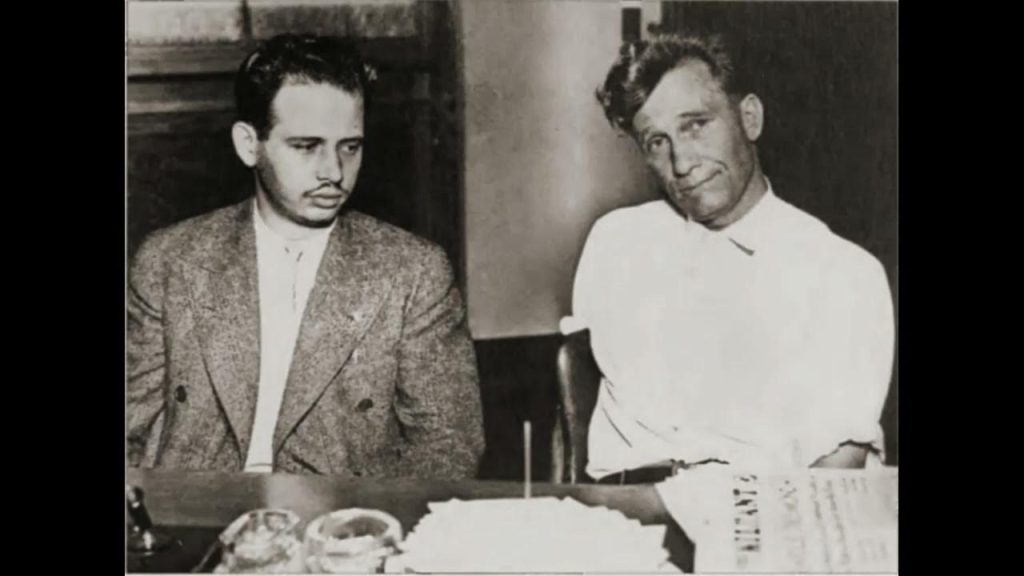
We note that the BT/IBT are at least critics of the cultism of the Spartacists but are flawed by their inability to nail down its political basis. Unfortunately, the New Zealand-centred IBT has shown signs of rightward political motion with its incorrect characterisation of Russia as ‘imperialist’ and taking positions denouncing ‘Russian imperialism’ in Ukraine and earlier Syria that are flatly wrong and reactionary. The BT are healthier but remain for now prisoners of their own political miseducation at the hands of Robertson and have not yet got to the root of the problem. The Norden tendency seems to be the only remaining trend in the original Robertson cult, and flatly defend indefensible actions of Robertson, smearing his critics in a manner that is like a time-warp from somewhere around 1983. This is because they were involved in such indefensible actions, despite having been later victimised by them, and unfortunately have so far been unable to come to terms with their own history.

Thirdly we agree with you about the Anti-Imperialist United Front (AIUF) as against Robertson, Norden and the Riley and Logan groups. The entire Spartacist tradition engaged in obscurantism and miseducation of their cadre about the AIUF, which was indeed put in thesis form particularly in the Theses on the Eastern Question at the Fourth Congress of the Communist International:
“The refusal of Communists in the colonies to take part in the fight against imperialist tyranny, on the pretext of their supposed ‘defence’ of independent class interests, is the worst kind of opportunism and can only discredit the proletarian revolution in the East. No less harmful, it must also be recognised, is the attempt to remain aloof from the struggle for the immediate everyday demands of the working class in the interests of ‘national unity’ or ‘civil peace’ with the bourgeois democrats. A dual task faces the Communist and workers’ parties of the colonial and semi-colonial countries: on the one hand, they are fighting for a more radical answer to the demands of the bourgeois-democratic revolution, directed towards the winning of national political independence; on the other hand, they are organising the masses of workers and peasants to fight for their own class interests, making good use of all the contradictions in the nationalist bourgeois-democratic camp…” (https://www.marxists.org/history/international/comintern/4th-congress/eastern-question.htm)
The argument of the old Spartacist tradition was that this was at odds with the permanent revolution, and that the Trotskyist movement ‘overcame’ this weakness and generalised permanent revolution to the whole of the colonial and semi-colonial world after the defeated Chinese revolution of 1926-7, thereby rejecting the AIUF. The view that the Permanent Revolution means rejecting the AIUF is shown to be false by Trotsky’s remarks on the nature of the ‘national’ bourgeoisie in his 1937 essay Not a Workers’ and Not a Bourgeois State:
“The internal regime in the colonial and semicolonial countries has a predominantly bourgeois character. But the pressure of foreign imperialism so alters and distorts the economic and political structure of these countries that the national bourgeoisie (even in the politically independent countries of South America) only partly reaches the height of a ruling class. The pressure of imperialism on backward countries does not, it is true, change their basic social character since the oppressor and oppressed represent only different levels of development in one and the same bourgeois society. Nevertheless the difference between England and India, Japan and China, the United States and Mexico is so big that we strictly differentiate between oppressor and oppressed bourgeois countries and we consider it our duty to support the latter against the former. The bourgeoisie of colonial and semi-colonial countries is a semi-ruling, semi-oppressed class.” (https://www.marxists.org/archive/trotsky/1937/11/wstate.htm)
“Supporting the bourgeoisie” of the oppressed countries against the imperialist oppressors is not blanket political support. It is self-evidently a variant of a united front, as explained in the Eastern Question theses:
“The workers’ united front is the slogan advanced in the West during the transition period, characterised by the organised gathering of forces. Similarly in the colonial East at the present time the key slogan to advance is the anti-imperialist united front. Its expediency follows from the perspective of a long-drawn-out struggle with world imperialism that will demand the mobilisation of all revolutionary elements. This mobilisation is made all the more necessary by the tendency of the indigenous ruling classes to make compromises with foreign capital directed against the fundamental interests of the mass of the people. Just as in the West the slogan of the workers’ united front has helped and is still helping to expose the social democrats’ sell-out of proletarian interests, so the slogan of an anti-imperialist united front will help to expose the vacillations of the various bourgeois-nationalist groups. This slogan will also help the working masses to develop their revolutionary will and to increase their class consciousness; it will place them in the front ranks of those fighting not only imperialism, but the remnants of feudalism.” (Theses on the Eastern Question, ibid)
This is not counterposed to the programme of permanent revolution. It is a transitional tactic pointing to the need for permanent revolution:
“While the bourgeois nationalists look at the workers’ movement from the viewpoint of its importance for their success, the international proletariat considers the new workers’ movement of the East from the viewpoint of its revolutionary future. Under capitalism the backward countries cannot share in the achievements of modern technical knowledge and culture without paying an enormous price in the form of savage exploitation and oppression by Great-Power capital. The workers in the East have to ally with the proletariat of the advanced countries, not only in the interests of their common struggle against imperialism, but because only the victorious proletariat of the advanced countries will give them disinterested aid in the development of their backward productive forces. Alliance with the proletariat in the West will pave the way to an international federation of soviet republics. For backward peoples the soviet system represents the smoothest form of transition from primitive conditions of existence to the higher Communist society which is destined to replace the entire capitalist world economy of production and distribution. This is borne out by the experience of the soviet system in the liberated colonies of the former Russian empire. Only the soviet form of government is able to ensure that the peasant agrarian revolution is consistently carried through. The specific conditions of agriculture in certain parts of the East (artificial irrigation), maintained in the past by a unique system of collective labour organised on a feudal-patriarchal basis but now undermined by capitalist greed, also require the kind of state organisation that can meet social needs in a planned and organised manner. In view of the special climatic and historical conditions, co-operatives of small producers will definitely play an important role in the transitional period throughout the East generally.” (Theses on the Eastern Question, ibid)
This both calls for a revolutionary alliance with the proletariat in the advanced countries, and explicitly holds up the example of the nations of the Soviet East – liberated by a revolutionary party whose leaders were driven by the practical carrying out of permanent revolution and the “Soviet system”, based on “state organisation that can meet social needs in a planned and organised manner”. This is obviously a tactic that concretely aimed at pointing the way to permanent revolution – the ultimate resolving of the tasks of national unification and social liberation under the class rule of the proletariat.
We therefore agree with your conclusion that:
“The anti-imperialist united front was essential then and still is today in all countries where the national liberation struggle is in the hands of the bourgeoisie. For communists to be able to break the bourgeoisie’s hold on the struggle, it is necessary to gain decisive influence among the proletariat, the peasantry and the lower strata of the urban petty bourgeoisie. And to do this, communists must not remain suspended in the air as immaculate critics on the margins of the struggle, but place themselves in the midst of the melee. We must win influence and prestige in the national and democratic struggle against foreign domination, and this can only be done by revealing to the masses the weaknesses, deficiencies and betrayals of the national bourgeoisie. That is the purpose of the anti-imperialist united front: to win the masses, to prepare the ground for the inevitable open conflict with the national bourgeoisie in the struggle against world imperialism.” (https://iclfi.org/spartacist/en/68/comintern)
What flows from the AIUF is an active, interventionist perspective regarding bourgeois-led movements related to democratic demands concerned with, or linked to, the national liberation of oppressed people vis-à-vis imperialist oppression. So, the AIUF mandated defence of Argentina in the 1982 Falklands/Malvinas war, in contradiction to the positions of the entire Spartacist ‘family’ (the Robertson, Riley, Logan and Norden groups). We certainly agree with your change of position.
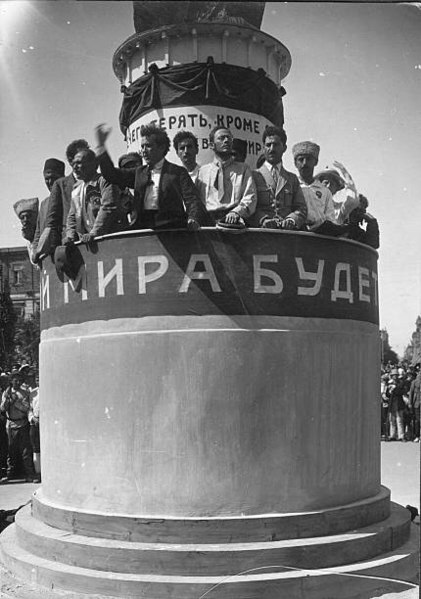
We also are pleased to see your active and interventionist position on the ground regarding national movements of oppressed peoples in the Global South, for instance your critical support for the left-nationalist Economic Freedom Fighters in South Africa, your refoundation of the Mexican section of the ICL based on an active aspiration to engage with national resistance to US imperialist domination. We are not able to simply endorse these positions in detail, as we do not have the detailed knowledge that would result from having forces on the ground in those countries, but we do endorse the aim of them – to positively apply the AIUF in a practical way.
We also note your intervention in the struggles against Milei in Argentina, and we certainly sympathise with your criticisms of sectarian elements on the Argentine left who make fine speeches in separate ‘Trotskyist’ events, that should be addressed to the mass of the workers who follow Peronism. We note your attempt to concretise the slogan of a workers’ government in Argentina, with the demand for an “FIT-U/CGT/CFA government”, consisting of the main ‘Trotskyist’ bloc, together with the main trade union bodies who are currently led by Peronistas. However, we do consider this may be mistaken in one sense, as the FIT-U does not currently have the degree of mass influence among workers that would make such a bloc viable. In part this is because of the softness of those tendencies involved on imperialism, which have meant they never generated such a mass base. We note the positive intent but suggest it probably needs more thought and the development of a base in the country itself. Not that this is easy or to be taken lightly – the creation of such an organisation is not an easy thing to do.
We agree with your repudiation of the chauvinist elements of the Spartacists’ position on the revolutionary upheaval in Iran in 1978-9, their fundamentally flawed equation of the movement led by the Shia ulema with the imperialist puppet Shah, and their evoking of fascist movements in imperialist countries to deny the component of the Shia-led movement that was directed against imperialist oppression. We consider this was a manifestation of the same Shachtmanism that led them to support Israel in 1948. We note that you correctly do not use this error as a rationale for any liquidationism in the face of the Khomeni movement:
“Our entire framework denied the fact that the struggle of the Persian masses to free themselves from the imperialist chokehold was a progressive struggle. Our task was to explain that as long as it remained in the grip of the mullahs, it would necessarily be directed against national and other minorities, leading to their persecution and at the same time undermining the liberation of the Persian majority itself. The only way to break the hold of the mullahs was to show concretely how their leadership was an obstacle to the legitimate and progressive aspirations of the masses to be free from the Shah and imperialism.” (https://iclfi.org/spartacist/en/68/permrev)
Overall, we consider the old Spartacists’ repudiation of the AIUF as containing a chauvinist component, refusing to involve themselves in the struggles of oppressed peoples, but attempting to cover up for this politically with a theorised rationale for abstention. We also consider this to be a manifestation of Shachtmanism, in an inverted, sectarian form. Shachtman in his earlier, more pseudo-leftist period, was capable of such leftist posturing, for instance in his denunciation of the Proletarian Military Policy in WWII, which the old Spartacists solidarised with, and also his withdrawal of support for China’s struggle for national independence against Japan in 1942, ostensibly on the ground that the Kuomintang then in command in China had become simply an instrument of Anglo-American imperialism. The Spartacists solidarised with both positions – those were sectarian manifestations of Shachtmanism, not as in most manifestations an opportunist manifestation.
Another related manifestation of Robertson’s Shachtmanism in a sectarian shell is their theorising about tactics of dealing with mass workers parties that engage in popular fronts with ‘radical’ bourgeois parties. The classic case being France in the 1930s, when Leon Blum’s French Socialist Party was propelled into government on a Popular Front platform jointly with the Communist Party and the small bourgeois Radicals. They make a correct point: whenever such blocs are formed, it is imperative to oppose them and to place no confidence in them by means of electoral support and the like. The aim of any electoral tactics used is to draw the class line, warn against the dangers that are embodied in popular fronts in terms of leading to major defeats of the working class, and to split such blocs along class lines.
A key means of doing this is to hammer on the contradiction between the fact that the workers party components of the popular front were formed as deformed expressions of class independence, and their joining a governmental block with a bourgeois party to their right, which is at odds with the notion that a party and a government is necessary that is accountable to the workers, not the bourgeoisie. Because of that, there are circumstances when the working class themselves will express opposition to such blocs by voting in such a way as to try to force a social-democratic party to take power without its bourgeois partners. Trotsky, in his writings on France in 1936, pointed to such an action as an example of working-class resistance to popular fronts and solidarised with it:
“… even under these conditions the masses were able to give expression to their desire: not a coalition with the Radicals but the consolidation of the toilers against the whole bourgeoisie. […]
“The Socialists and the Communists worked with all their might to pave the way for the ministry of Herriot — at worst the ministry of Daladier [i.e. politicians of openly bourgeois parties]. What did the masses do? They imposed upon the Socialists and Communists the ministry of [SFIO leader Leon] Blum. Is this not a direct vote against the policy of the People’s Front?” (The Decisive Stage, from Leon Trotsky on France, Monad Press, 1979, pp157-8).
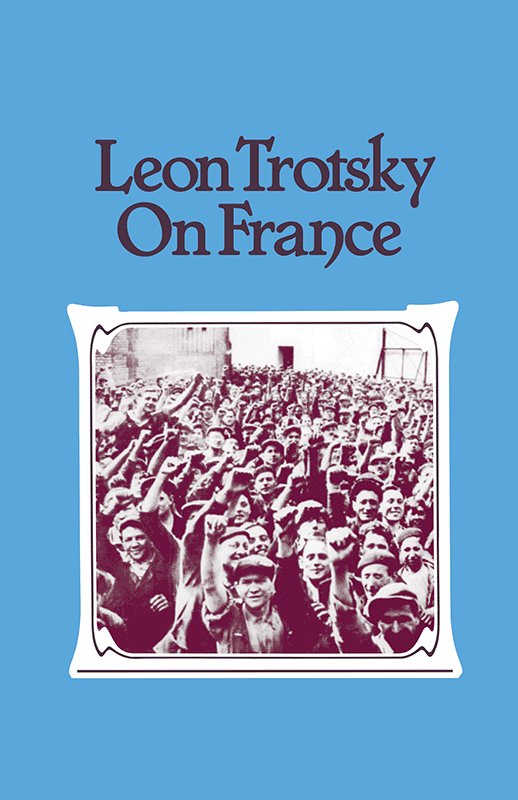
The Spartacists, while correctly warning of the danger of the Popular Front in Chile in 1970-72, developed a position that rejected this approach in principle, arguing that when a mass bourgeois workers party enters into a popular front coalition the class contradictions within it are suppressed, they cease to operate, and it is not possible for Marxists to exploit those contradictions until the popular front is broken. The leads to a Catch-22. They believe it is not possible to exploit such internal class contradictions to break the popular front. So how then are popular fronts to be broken? By ferocious denunciation alone?
This idea that such class contradictions cease to operate is a methodological position, again, derived from a sectarian inversion of Shachtmanism – it defines away the proletarian pole in a bourgeois workers party and treats it as an outright bourgeois formation for the duration. It leads to a passive acceptance of popular front coalitions on the grounds that nothing can be done to break them. It may sometimes be difficult to formulate an electoral tactic that can really exploit such issues and cause such a rupture, but for a Marxist organisation to refuse to attempt to find such tactics, and be reduced, in the words of the Spartacists themselves, to “giving out leaflets saying ‘please don’t vote for the popular front’” is not an effective policy. It is sterile abstentionism. This issue is discussed at some length in an exchange of ourselves with the then-IBT, but it was first raised internally in their organisation in 1998 (see https://www.consistent-democrats.org/critical-support-popular-fronts-and-bourgeois-workers-parties/), when they refused to discuss it. It is a policy consistent with the old Spartacists’ long-time refusal to seriously engage with, and try to split, mass social democratic and Stalinist organisations.
We agree with many of your points about the essential identity in practice between Trotsky’s theory of Permanent Revolution, as initially laid out in his 1906 work Results and Prospects, and Lenin’s overall perspective in his 1905 Two Tactics of Social Democracy in the Democratic Revolution, which was written in February 1905. It should be noted that some of the limitations of the latter are rooted in that it was written without the full experience of the 1905 Revolution. Its hypothesis that the bourgeoisie would be hostile to and betray the revolution was correct, like Results and Prospects it projected that the working class would have to ally with revolutionary peasant masses to resolve the main democratic questions posed by Tsarism in opposition to the Russian bourgeoisie. However, it did not go so far, as did Trotsky’s later work, in projecting that the proletariat would have to conquer power as a class and institute socialist measures. It projected that the proletariat and peasantry would have to substitute for the bourgeoisie and force through bourgeois economic and social development:
“Marxists are absolutely convinced of the bourgeois character of the Russian revolution. What does this mean? It means that the democratic reforms in the political system and the social and economic reforms, which have become a necessity for Russia, do not in themselves imply the undermining of capitalism, the undermining of bourgeois rule; on the contrary, they will, for the first time, really clear the ground for a wide and rapid, European, and not Asiatic, development of capitalism; they will, for the first time, make it possible for the bourgeoisie to rule as a class.” (https://www.marxists.org/archive/lenin/works/1905/tactics/ch06.htm, emphasis added)
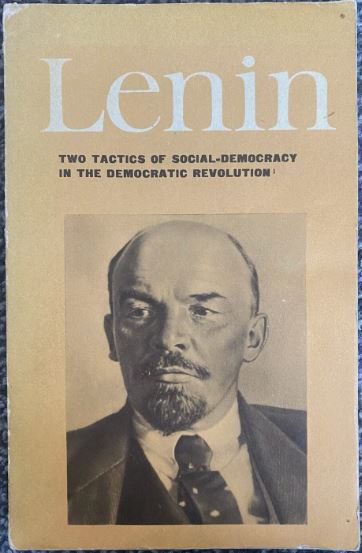
This was clearly flawed, as was shown in 1917, when Lenin was forced to relegate the slogan of the “Democratic Dictatorship of the Proletariat and Peasantry” to the “museum of pre-revolutionary antiques”. However, that ‘Jacobin’-like perspective of a radical worker-peasant alliance forcing a bourgeois revolution upon the bourgeoisie against its will mandated the creation of a disciplined working-class vanguard/combat party to carry it out, which Lenin and his immediate followers were highly successful and motivated in doing. They were in a way immersing themselves in the fight for the permanent revolution, even though they were not fully conscious of its nature.
To Trotsky, who was more conscious of the proletarian nature of the coming revolution and was closer to the practices of the European workers movement in that regard, Lenin’s party appeared to resemble a Jacobin, elitist party (as expressed in his 1904 essay critical of Lenin, Our Political Tasks). That misunderstanding could only be understood dialectically as a product of the interaction of differing class strands within a revolution that was building in a subterranean, molecular fashion. These strands belonged together in a synthesis, but that could only happen when the revolution burst the limits of Tsarism, as it failed to do in 1905, but did in February-March 1917. It then became clear that the Two Tactics perspective was unviable, but the party that had been built in struggling for it was the ideal instrument to carry out a proletarian-led ‘permanent’ revolution.
That in our view is the point of the difference between Trotsky and Lenin on the nature of the revolution before 1917 – Trotsky was closer to the truth about the actual nature of the revolution that must ensue from the overthrow of Tsarism, but Lenin’s more slowly developed understanding led him to build a party that could carry out Trotsky’s perspective, which Trotsky, because of his own errors and misunderstandings, was then incapable of building. This really demonstrates that the development of revolutionary organisations is not a linear process, but itself develops through contradictions.
We concur with your renunciation of much of the earlier Spartacists’ views on the national question and ‘interpenetrated peoples’. We consider your apparent change of position on Ireland to be correct as far as it goes, though it is not quite as clear as the position you have taken on the Middle East, as it does not clearly call for the unconditional reunification of Ireland, or “Self-determination for the Irish people as a whole” which was always a correct position along with the demand for immediate withdrawal of British state armed forces. Your polemic against your old position on Ireland is correct as far as it goes:
“…It was clearly impossible to ‘remove’ the national question from the agenda in places like Belfast or Gaza. We thus proclaimed the need for revolution. But the whole question remains: how can a revolution happen there? The entire program behind the ‘theory’ of interpenetrated peoples consisted of proclaiming the need for socialist revolution while rejecting the need to put the national liberation struggle of Palestinians and Irish Catholics at the centre of our revolutionary strategy. Instead, the socialist revolution is viewed as a process in which both national groups will shed their national sentiments in favour of unity on economic demands and liberal solidarity.
“Any ‘Marxist’ who thinks that the national liberation struggle is a thorn in the side of revolution and must be put aside in order to fight for socialism is at best condemned to irrelevance or, at worst, an agent of the ruling oppressor who demands that the oppressed abandon their national aspirations as the precondition for unity. The only way a revolution will happen in Israel/Palestine or in Northern Ireland is through an uprising for the national liberation of Palestinians and Irish Catholics, which would not impinge on the national rights of the Protestants and Israelis but emancipate the workers from their ruling class and its imperialist backers. It is precisely because Irish and Palestinian nationalists are incapable of and opposed to such a perspective that only a communist leadership can bring about a just and democratic resolution to the national problem there.
In a sign of utter impotence, the ‘Theses on Ireland,’ a key document elaborating our view on the national problem there, states in its first thesis:
“The strong possibility remains that a just, democratic, socialist solution to the situation in Ireland will only come under the impact of proletarian revolution elsewhere and concretely may be carried on the bayonets of a Red Army against opposition of a significant section of either or both of the island’s communities.”
In regard to Palestine, our articles constantly stressed that revolution is most likely impossible until there is a revolution in a neighbouring country. To declare in advance that we do not really believe in the possibility of a native revolution in Northern Ireland or Palestine and that we do not view our intervention as playing a vital, decisive role in these regions amounts to raising a banner reading: ‘We Are Bankrupt.’” (https://iclfi.org/spartacist/en/68/permrev)
We consider that the main agency of permanent revolution in Ireland is the nationalist working class, and the main agency of permanent revolution in South-West Asia is likewise the Arab workers and fellahin. What you say sounds good and we await further elaboration of your critique.
Related to this, we note the material from earlier in the evolution of the current within the Spartacists which gave birth to the current leadership, and the material it produced on the national question regarding Quebec within Canada, particularly in the document “The Struggle Against the Chauvinist Hydra”. We note that whether or not it is correct to call for the actual separation of Quebec from Canada (which is arguable), the position that you argued on the right of the Quebec legislature to pass the French language laws is correct, as the insistence on ‘equality’ of languages in the context of an overwhelmingly Anglo-dominated state can only act in practice to undermine the minority language. We endorse the right to self-determination of such nations as Quebec, and even short of separation, the right to resist what amounts to a forced assimilation by stealth seems correct, in cases where nationhood is closely associated with a widely spoken language.

We note that in the same document you made a series of important observations and proposed positions related to smaller, oppressed nations in parts of Europe, including Basques and Catalans (in Spain and France), the people of Corsica, the various peoples that make up the state of Belgium (Flemish and Walloons), calling for the dissolution that state. At the end of the sections on these questions you also include the demand for Scottish independence. This was published in the Summer of 2017, and we understand that you have moved on considerably politically since then, including posthumously breaking with Robertson who at the time professed to support you. Nevertheless, while we consider your points on these smaller nations are positive in attempting to address some important democratic questions, there are also some glaring contradictions in this. You wrote then:
“The national question in Belgium, as well as the fate of Brussels, is closely linked to the imperialist institutions on the ground. NATO and the European Commission both set up their headquarters in the capital, and the imperialists fear the instability that a breakup of Belgium would create. The EU, in particular, plays a leading role in maintaining national oppression among its member states. Independence for Catalonia, the Basque Country, Scotland or for the Flemish and Walloons would challenge the very existence of the EU, which fears that the borders of its member states may be redrawn. Thus, in the case of Belgium, it is all the more unlikely that the breakup of the country would take place absent a movement against the EU. We say: Flanders and Wallonia, out of the European Union! European Union, out of Brussels! Our wavering on this question is not unconnected to other problems of accommodating the EU that have been fought out in our organization. (https://old.iclfi.org/english/esp/65/hydra.html, emphasis in original)
The EU, or rather the main European imperialist states at its core, is certainly hostile to the rights of small nations, but so are the imperialist opponents of the EU. In Britain there was a ‘movement against the EU’ and Britain voted narrowly for Brexit a year earlier than this, in 2016. Previously in September 2014, there had been a referendum on Scottish independence, which was defeated based on the assumption that Britain would stay in the EU. The Scottish nationalists, understandably not keen on complete economic and political isolation in the event of a break with the UK, campaigned for ‘independence in Europe’ (i.e. Scotland joining the EU) but failed to win the referendum. Within two years the UK was on its course out of the EU and Scotland dragged with it. Of course, the British nationalists who fought to withdraw the UK from the EU had no truck with Scotland’s right to self-determination – they are British/English chauvinists. And yet the Spartacist League/Britain were so vehement in their support for Brexit that their rhetoric on this resembled UKIP!
The document on the ‘Chauvinist Hydra’ captured something about the impact of the EU on its various components when it wrote:
“The question should be addressed in the following general framework: first and foremost, we are for the shattering of the European Union from an internationalist starting point. That said, since its breakup is currently being posed through the exit of individual member states, we cannot be neutral when the question arises. There is no formula over when or how to raise the call for a member country to leave the European Union. That depends on the country in question as well as on the concrete circumstances. Before the proposal for a referendum in Britain, the call ‘Britain out of the EU’ could have only been perceived as nationalist: for a stronger, imperialist England ‘liberated’ from Germany. In contrast, the call for Greece out of the European Union can widely be understood in that country as opposition to the oppression of Greece at the hands of the European Union and Germany. In any case, such calls should be placed in the more general framework of our program for the breakup of the European Union, putting forward a class axis.”
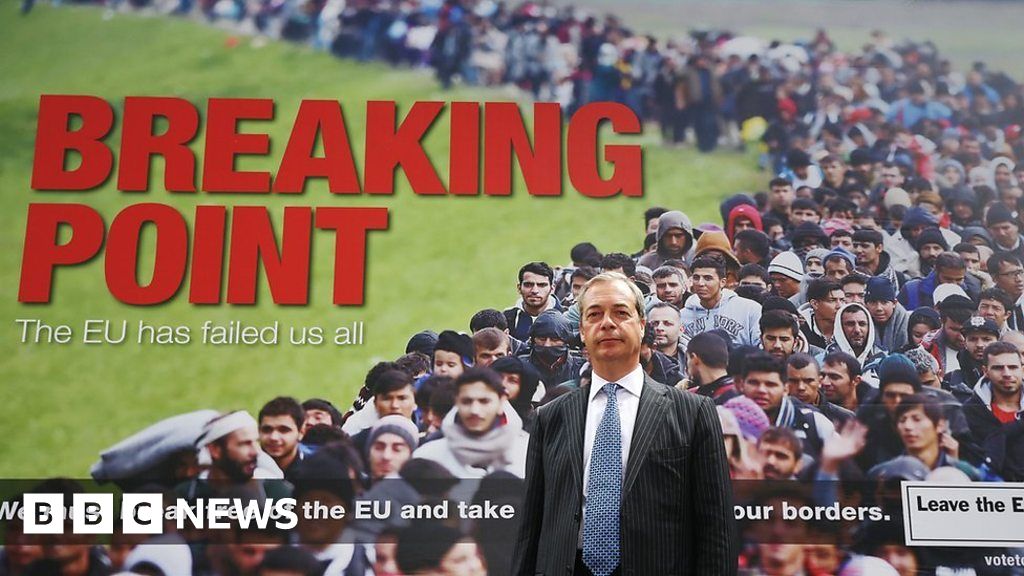
The Brexit referendum campaign in 2016 was dominated by UKIP and the nationalist right wing of the Conservative Party, and indeed was “for a stronger, imperialist England”. Even leftist, little-England Bennite campaigns for a utopian, national-reformist exit from the European Union were completely marginal – the thrust of the campaign was nationalist and anti-immigrant. There is no way to give such a campaign a ‘class axis,’ and attempting to do so led the SL/B to confessedly give political support to the Conservative Party, and to sound like UKIP. As was admitted in the 2021 Conference document, almost in passing, when characterising a particularly egregious, British nationalist SL/B article on Brexit:
“The implicit position defended here by WH is that Marxists must support whatever Brexit deal the Tories will cut in the name of “Brexit today”, which amounts to political support to the Tories.” (https://iclfi.org/spartacist/en/67/slb – emphasis in original)
We consider your point about the domination of the post-Soviet world by imperialist liberalism under an enhanced US imperialist world hegemony, and of there being a failure of the international left to oppose this liberalism, looking instead for inter-imperialist rivalry (which did not materialise after the collapse of the USSR) to be a worthwhile insight. But we suspect that you have taken it too far and overlooked one crucial aspect of the nature of the imperialist bourgeoisie, whose analysis by the Spartacists in the 1970s showed some real foresight. Ironically given your new leadership’s condemnation of “Seymour’s Marxism” – some of the relatively abstract articles he formulated to give a degree of theoretical weight to Robertson’s Shachtmanite deviations regarding the nationalism of oppressed peoples – when Joseph Seymour came to deal with the nationalism of the imperialist bourgeoisie, in our view he got something important correct. His 1977 Essay On Bourgeois Class Consciousness made the following important point about Lenin’s theory of imperialism:
“The issue was first posed sharply in the Marxist movement by Kautsky’s theory of ultra-imperialism, which held that competition between imperialist nations could be peacefully mediated in the same manner as competition between domestic monopolies. Lenin countered that the bourgeoisie cannot transcend national interests and that inter-imperialist agreements can only be based on the existing balance of strength which all parties are desperately seeking to change to their advantage.”
We consider that Seymour was right, that the nature of the imperialist bourgeoisie is that it is fundamentally a national class, and that phenomena such as the ‘liberalism’ and relative lack of national antagonism between imperialist nation-states that was dominant in the period since the collapse of Stalinism, was simply a product of a temporary relationship of forces – a US world hegemony – which is now breaking down. The conclusion to be drawn from this is that imperialist-nationalist hostility to pan-national imperialist blocs, such as the European Union, is not progressive in the least, but simply an expression of the more fundamental nature of imperialist capitalism reasserting itself. So, Brexit, and other similar movements against European ‘integration’, or indeed other forms of imperialist integration anywhere else in the world, are not in the interest of the working class at all, but simply reactionary expressions of imperialist interests. Despite knowing nothing of the post-Soviet world when he wrote this in 1977, Seymour appears to have anticipated Brexit, Trumpism, Salvini, the AfD, and other manifestations of renewed imperialist nationalism which you comrades seem to have illusions in. We note the peculiar, boxed-off presentation/publication of this essay by Seymour in Spartacist #24, and wonder if this was some kind of veiled polemic against Robertson’s implicit support for imperialist separatism, which became manifest in the Spartacists’ 1979 call to boycott the European elections.
The question of oppression of Greece by European imperialist powers, and the role of the EU as the agency of crucifying it, should have been addressed as an anti-imperialist struggle, not as part of hostility to European integration. The reason for the economic crucifixion of poorer member-states, which was not confined to Greece but also affected even imperialist Italy, is the contradiction between a single currency and separate state powers with fiscally separate national debts. In other words, that a single currency does not go far enough. It would certainly be legitimate for Greece to have repudiated its outrageous debts and created a new Drachma as an instrument to walk out of the Eurozone and logically the EU also.
That would have been a quasi-revolutionary, anti-imperialist act, and despite Syriza winning a referendum that effectively gave them a mandate to do just that, they did not have the political courage – they capitulated completely to the EU’s austerity programme. The job of workers in the rest of the EU would have been to solidarise with such an act of Greek resistance had it occurred, with political strikes and mass movements to force the EU to back down from all retaliatory measures against Greece. But there is one other relevant demand, particularly given that this resistance did not happen. And that is the demand for the Greek debt to be cancelled by the EU, or more accurately transferred to the debt of the whole EU itself. That demand begins to break down the contradiction between the existence of a single currency and separate state powers that rends the EU.
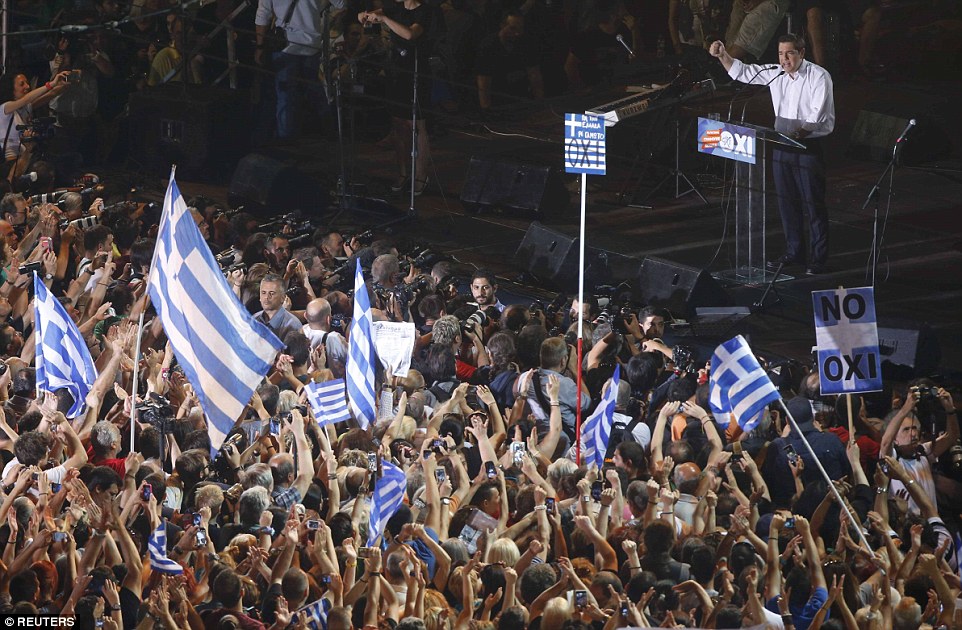
Robertson’s support for British nationalist opposition to the EU was long-standing and always wrong. You have renounced their boycotting on principle of elections to the European Parliament, which has been their public position since at least 1979, in passing along with repudiating their later un-Marxist position of refusing to stand for executive office in bourgeois states. But their Euro-elections position flowed from this position of supporting British nationalist opposition, which is reactionary and always was, and did amount to political support for imperialist nationalism. There is not and never was anything progressive about the policy of British withdrawal from the EU. Britain outside the EU is just as imperialist as Britain within the EU. To support Brexit logically means projecting the British state as in some way progressive. In which case political support for the Tories under Boris Johnson is completely logical.
From the standpoint of consistent Marxism and Trotskyism, there is nothing progressive about the withdrawal of any of the imperialist components of the EU, from that body. Defiance of the EU by any of the non-imperialist components of the EU can have an anti-imperialist content, but support for ‘national struggles’ led by imperialist nationalist forces against the EU inescapably points to the view that imperialist British, French, German, Italian, Dutch, Belgian, Danish, Swedish, etc nationalism are in some way progressive. They are not; taken separately these states are just as imperialist outside the EU as within it. There is nothing progressive about imperialist separatism and never was. And the correct context for raising the demands that you raise for “Independence for Catalonia, the Basque Country, Scotland or for the Flemish and Walloons” is in the context of fighting concretely for the transitional demand of a United States of Europe through demanding the abolition of the separate economic existences of the imperialist powers at the core of the EU, not through supporting imperialist separatism. Imperialist separatism is reactionary and is necessarily fascistic in its implications and programme.
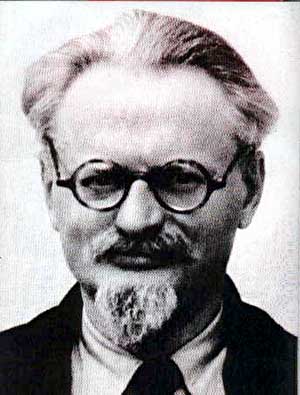
The logic of this characterisation can be found in one important, but neglected work of classical Marxism/Trotskyism – neglected, that is, by the Spartacists – and most other Trotskyists. We refer to Trotsky’s June 1923 essay The United States of Europe, which is subtitled: Is the Time Ripe for the Slogan: ‘The United States of Europe’? (A Discussion Article) (all quotes from https://www.consistent-democrats.org/the-united-states-of-europe/) In it, Trotsky projects demands for economic and political integration of the existing bourgeois states as transitional, pointing the way for the masses to the need for a Socialist United States of Europe, and connected with resisting the tendency of the US to try to dominate Europe. Trotsky wrote:
“In connection with the slogan of ‘A Workers’, and Peasants’ Government’, the time is appropriate, in my opinion, for issuing the slogan of ‘The United States of Europe’. Only by coupling these two slogans shall we get a definite systematic and progressive response to the most burning problems of European development.”
Trotsky continues to elaborate the transitional character of the demand:
“To the toiling masses of Europe it is becoming ever clearer that the bourgeoisie is incapable of solving the basic problems of restoring Europe’s economic life. The slogan: “A Workers’, and Peasants’, Government” is designed to meet the growing attempts of the workers to find a way out by, their own efforts. It has now become necessary to point out this avenue of salvation more concretely, namely, to assert that only in the closest economic co-operation of the peoples of Europe lies the avenue of salvation for our continent from economic decay and from enslavement to mighty American capitalism.”
Trotsky’s words were written in the period when the United States was in the process of jockeying for position with Britain and Germany in the quest for the position of imperialist hegemon, which it only gained after WWII. However, there are resemblances to this period now that the decline of US hegemony has led the US to take outrageous actions such as the destruction of NordStream, blatantly aimed to force Europe into a qualitatively enhanced dependency on the US. One could reasonably suspect that behind Robertson’s attitude was an unspoken US American chauvinist policy, of promoting the kind of US enslavement of which Trotsky spoke:
“America’s standing aloof from Europe, tranquilly biding her time until Europe’s economic agony has reached such a pitch as will make it easy to step in and buy up Europe – as Austria was bought up for a mere pittance. But France cannot stand aloof from Germany, nor can Germany stand aloof from France. Therein lies the crux, and therein lies the solution, of the European problem. Everything else is incidental. Long before the imperialist war we recognised that the Balkan states are incapable of existing and of developing except within a federation. The same is true of the various fragments of the Austro-Hungarian Empire, and of the western portions of tsarist Russia now living outside the Soviet Union. The Apennines, the Pyrenees and Scandinavia are limbs of the European body stretching out toward the seas. They are incapable of an independent existence. The European continent in the present state of development of its productive forces is an economic unit – not a shut-in unit, of course, but one possessing profound internal ties – as was proved in the terrible catastrophe of the world war, and again revealed by the mad paroxysm of the Ruhr occupation. Europe is not a geographical term; Europe is an economic term, something incomparably more concrete especially in the present post-war conditions – than the world market. Just as federation was long ago recognised as essential for the Balkan peninsula, so now the time has arrived for stating definitely and clearly that federation is essential for Balkanised Europe.”
It is almost uncanny the way the connection with Russia is posed: such measures as the destruction of NordStream were and are meant to break this connection today:
“Even if temporarily isolated (and with such a great bridge to the East as the Soviet Union, Europe will not be easily isolated), Europe will be able not only to maintain herself, but to consolidate and build herself up, once she has broken down the customs barriers and has united herself economically to the inexhaustible natural riches of Russia. ‘The United States of Europe’ – a purely revolutionary perspective – is the next stage in our generally revolutionary perspective. It arises from the profound difference in the situations of Europe and America. Whoever ignores this difference, will willy-nilly, drown the true revolutionary perspective in mere historical abstractions. Naturally, the Workers’, and Peasants’, Federation will not stop in its European phase. As we have said, our Soviet Union affords Europe an outlet into Asia, and from Asia into Europe. We are therefore, here envisaging only a stage, but a stage of great historical importance, through which we must first pass.”
Of course, the USSR no longer exists as a workers’ state, but nor have all traces of the revolution disappeared from the world geopolitical scene.
You appear to have been influenced in a contradictory way by some of the nationalist and right-wing populist political forces you have been tailing at times, and some of the influence seems to have played a role in you at least partially breaking from the most egregious, Shachtmanite political deviations of Robertson. We are not moralists – we recognise that this is a period of considerable ideological confusion between left and right which has even affected many good communists and socialists, as well as throwing up some very contradictory new layers and political figures who evidence genuine confusion of a similar sort. We will engage politically with layers who are a lot more politically confused between left and right than yourselves – in West Asia, there are many who have been on the receiving end of Zionist crimes who are confused about the historical truth of the Nazi holocaust, for instance. We do understand that some of the angst you comrades expressed in the Covid pandemic may have played a role in your breaking from old Spartacism.
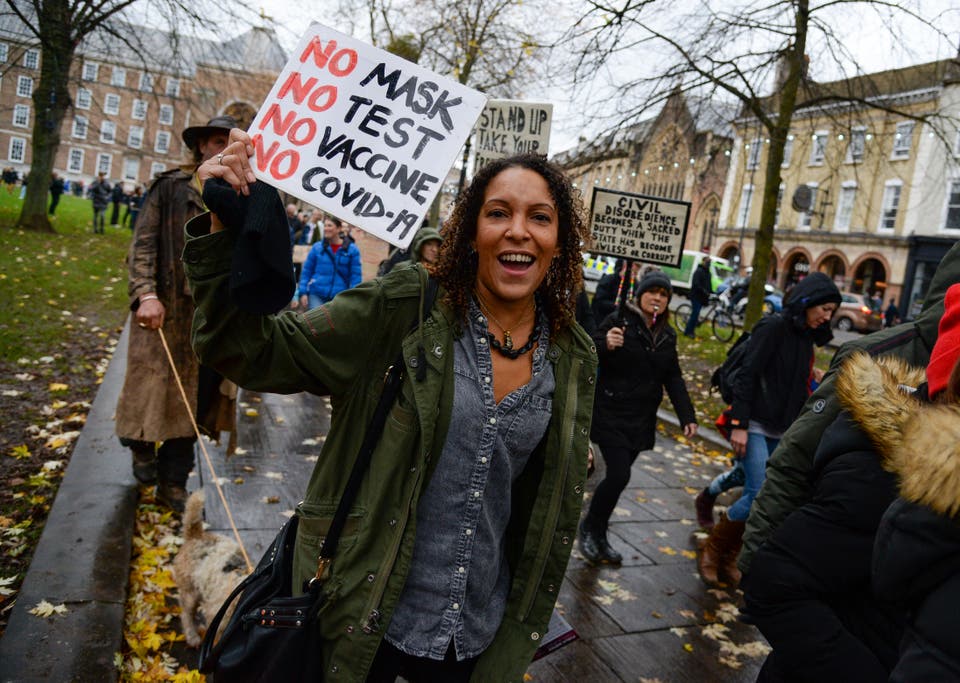
But you were still wrong about Covid. Simply calling for ‘Down with the Lockdowns’ was an absurd position faced with a new disease spreading rapidly between humans that killed a significant proportion of those infected and maimed many more. Carefully limiting social contact to avoid such spread is a basic act of collective self-defence of ordinary people. Of course, the ruling class exploited this catastrophe for their own purposes, of course our rights and social gains came under attack and that had to be opposed in whatever way possible. But preserving working class lives and safety are just as paramount, in some ways more so. You seem to be unaware that at least part of the ruling class – usually the populists like Johnson and Trump – wanted retired workers to die off to save on pension costs etc. Or as Johnson put it “let the bodies pile high”. We think the working class should seek vengeance for this.
In this country, after the disposal of Corbyn, Starmer and Johnson worked together to force re-opening of schools in the autumn of 2020 even before there was any vaccine available – and both attacked the teachers’ unions to do so. The infamous sacking of shadow Education Secretary Rebecca Long-Bailey professed to be about a preposterous accusation of ‘anti-Semitism’ – against someone who had grovelled to the Zionists during her own unsuccessful leadership campaign a few months earlier. Even in Starmerite terms, the accusation was completely phoney. The real reason is that for all her other capitulations, she refused to back down over supporting the teaching unions’ demands to keep the schools closed for safety reasons. Starmer sacked her so that he would be free to back Johnson’s demand for the schools to be reopened, several months before any vaccine was able to be manufactured and distributed.
But the anti-scientific bombast you came out with in practice backed Johnson and Starmer:
“Throughout the pandemic, all of the pseudo-revolutionaries — echoing the trade union tops — have preached the lie that the capitalist state is there to protect workers. Their programme to protect health and safety has been to advocate harsher and longer lockdowns, more plant and school closures and stricter safety rules and Covid guidelines enforced by the health agencies of the bosses. This is suicidal and a betrayal of socialist principles!
Unions are the elementary defence organisations of the proletariat. Their purpose is to defend workers on the job, not fight to send them home! Unions must fight now for trade union control of health and safety! The unions, not the capitalist state, should determine what conditions are safe to work under …” (https://old.iclfi.org/english/wh/247/pandemic.html)

Anti-scientific, and objectively anti-worker, anti-union nonsense. You don’t believe then that unions had the right in those conditions to demand workers be sent home to defend their ‘health and safety” in the face of a dangerous disease, then with no cure or vaccine, spreading among them! Unless they had at their disposal some biological or medical means to stop the spread of that disease, then you were basically saying that workers should risk their lives to keep their workplaces open. You didn’t really believe that “unions … should determine what conditions are safe to work under” if they concluded that, at that point, they were not safe. This was Boris Johnson’s position, and Starmer’s regarding the schools, but not the view of the unions. Your entire polemic was an inversion of reality – and you were demanding that unions should play Russian Roulette with the lives of their members in these conditions.
Then there is your equally foolish position on vaccines. Of course, vaccines are to be welcomed, albeit cautiously in the circumstances of the time. The same blind foolishness playing Russian Roulette with workers led you to write:
“It is in the interest of the working class that everyone on earth be vaccinated against Covid-19. We are for mandatory vaccination, ie being forced to get a jab in your arm. It is not a democratic right to refuse to be vaccinated and spread the virus.” (ibid)
There is an obvious problem with this. At this point these vaccines were new, untested and not proven to be safe. Many workers were fearful of them therefore, and the uptake was slower than it would have been if the vaccines were known to be tested and reliable. But you wanted to use physical force to force workers to “get a jab in their arm”. And you polemicise against the logical conclusion of this policy of compulsion:
But we oppose its enforcement through policies which attack the working class in the name of vaccination. We oppose the government firing NHS workers or any other worker because they aren’t vaccinated. Mass layoffs are an attack against the working class and the unions; we oppose them no matter the reason. We also oppose the vaccine passports, which would track every movement of the population and turn every pub employee and shopkeeper into a cop auxiliary. (ibid)
That only shows you did not have the courage of your convictions. As without state enforcement, your compulsory vaccinations would have been simply unenforceable. Any sane working-class militant would advocate further, gradual testing of the new vaccines and gradual increase of their usage insofar as they were proven to be safe. To build up resistance and restore full economic life as quickly as possible as to be compatible with safety. But in any case, all this bravado was only published after the vaccines began to be rolled out.
Unlike the ICL, the LCFI did not collapse during the pandemic. Nor did we engage in any adventurism with anyone’s health. We unfortunately had one person we had worked with politically in Britain die of Covid, and another contact who we spent a lot of time discussing with later died because of the flaws of a vaccine that was not fully tested. We produced this international statement April 2020, long before the vaccines appeared:
“We support the quarantine and demand effective measures of public health. We will also support agitation to force recalcitrant neoliberal regimes to carry out such measures where they a playing with obscenities like Johnson’s injunction to the British population to ‘take it on the chin’. While there is no vaccine or cure for this new disease the working class is in a defensive, backs-to-the-wall situation and needs to be extremely cautious about protecting its most vulnerable and frail components. We must seize on the weapon of quarantine to protect ourselves, and fight for the nationalisation of health provision and its supply chain, housing for the homeless, and protections for workers sacked because of the pandemic. We defend the international solidarity efforts of the workers’ states and peoples oppressed by imperialism against the pandemic, as Cuba has been doing.
But this situation is causing the capitalist system to totter economically, and we must demand of the bourgeois states every possible measure to negate the ruinous impact of capitalism and neo-liberalism on the masses. We demand the expropriation of private healthcare and the privileges of the rich to save as many working class people as possible from the pandemic. We demand the expropriation of failing industries in the economic crisis, and that all workers, in regular and ‘casual’ employment of all kinds, be paid in full for the duration of the pandemic. We demand economic planning to handle the economic needs of the masses under quarantine; the idea that market economics and neoliberalism can be any kind of solution to any of this is poisonous rubbish, too preposterous for words. Such is the international nature of this human crisis that this must be on a world scale if a terrible death toll is to be avoided in the poorest parts of the world.
At the same time we must be vigilant against attempts by far right and fascist forces to exploit the need for a quarantine to attack the democratic rights of the masses, to attack our freedom to criticise, to institute a dictatorship. An ominous example is the demand of Orban in Hungary for the right to rule by decree for the duration of the pandemic. There are similar dangers from Trump in the US, from Johnson in Britain, and in many other places. We must be on our guard.
Above all we demand and seek the world revolution, as the only way to save the working class, and the planet on which we live, which is being degraded and polluted, particularly through capitalist mode of production induced climate change, to the point where human extinction is on the horizon. Capitalism has caused a devastating Climate Change that in combination with systematic destruction of nature have caused unprecedented degradation of nature throughout the world. This allows deadly viruses such as the coronavirus to evolve, adapt, and jump from animals to humans. While we are facing such a deadly threat it may appear unrealistic to talk of world revolution, but the root causes of this calamity, and others to come, dictate political and economic tasks that only the world proletariat in power can solve. This particular disaster will end at some point and there must be a reckoning with its causes. We need worldwide economic planning, we need an end to the destruction of the ecosphere, we need the revolutionary overthrow of capitalism worldwide.” (https://www.consistent-democrats.org/uncategorized/the-covid-19-pandemic-and-the-world-capitalist-crisis-statement/)
We are perfectly prepared to believe, as you say, that the political blowup in the ICL over Covid played some kind of role as a catalyst for you to embark on a trajectory towards a healthy rejection of several of Robertson’s worst positions. Political life and evolution of currents is complex and often contradictory. But we will not pretend that your attitude to Covid was Marxist. It resembled a form of anti-scientific anarchism and seemed to be partly driven by tailing after some elements of right-wing populism.

We also consider that the Spartacists abstentionism when workers with a social-democratic consciousness go into battle against the bourgeoisie in elections was a manifestation of Roberston’s sectarian variation of Shachtmanism. We note that you appear to have broken with some of that that practice – the fact that you did work campaigning for George Galloway’s Workers Party in the 2024 General Election and attempted to do the same with the Socialist Party’s electoral vehicle TUSC, is evidence of a break with this sectarian manifestation of Shachtmanism that marred Spartacist practice for many years. We certainly regard that as a progressive development as far as it goes.
However, an examination of the conference document of the SL/B from 2021 shows clearly continued inability to politically deal with social democracy, and Trotskyist tactics towards it. It is strange indeed that this document devotes considerable space to agonising about supposed ‘adaptation’ to the movement around Jeremy Corbyn in 2015, and all kind of quibbles about nuances and alleged deviations among your comrades from some kind of ‘pure’ Spartacist line on how to deal with Corbyn, yet devotes much less space to the much more serious deviation from communist politics embodied in the self-confessed ‘political support’ your comrades gave to imperialist British nationalism and the right-wing populist politics of Boris Johnson’s Tories in the same period. This shows severe disorientation and is a reflection of your continued adherence to elements of Robertson’s deviant politics which found expression in Spartacist politics … his imperialist chauvinism. How on earth can this self-confessed political support for the Tories not be a much more serious issue in the SL than tactical differences on how to deal with the Corbyn movement, given the fundamental class difference between the two? This is a sign of serious disorientation in our view.
Your attitude to the Corbyn movement itself was an example of sectarian abstentionism. The victory of Jeremy Corbyn in 2015 in his challenge for the Labour leadership was the most stunning victory of a left-wing challenger in the entire history of the Labour Party. The only other such victories of those on the left of the party were those of George Lansbury in 1932, and Michael Foot in 1980. But neither are really comparable – Lansbury did not lead a challenge for the leadership – it fell into his hands virtually unopposed after the right-wing led by Ramsay MacDonald walked out of the Labour Party into coalition with the Tories in 1931, the most notorious act of betrayal to old-style finance capital in the history of the Labour Party. And Foot, by the time he became leader, was a near-geriatric who had already capitulated to the right wing decisively – Spartacist Britain in 1982 described him as a “caretaker” appointed by the union bureaucracy, and “a living metaphor for the shambling state of the party” after its election defeat by Thatcher in 1979.
The SL/B admit, in contrast, that “The 2015 election of Corbyn as leader of the Labour Party marked a sharp turn to the left after decades of Blairite domination of the party and represented a major change in the political landscape in Britain.” Yet you refused to draw the obvious organisational conclusion from this and carry out the classic Trotskyist tactic of entryism into the Labour Party despite conditions obviously as ripe for such an entry as they had ever been since the Second World War at least.
If entryism was not principled in Labour in circumstances of “a sharp turn to the left” after “decades” of right-wing domination and constituting “a major change in the political landscape in Britain”, then when would it ever be principled? You may be aware that prior to WWII, British Trotskyist organisations such as the Marxist League, the Revolutionary Socialist League and the Workers International League, conducted systematic entry work in Labour even in the absence of the kind of startling political shift in the working class that put Corbyn into the leadership.
Yet we see a somewhat surreal debate in the SL/B about the supposed ‘capitulation’ of the organisation to Corbynism and left-reformism in this context. A year after Corbyn was elected leader, the Blairites tried to engineer a coup, nicknamed the ‘Chicken Coup’ (because of the cowardly manipulation of those involved) to remove him from the leadership. Part of the bureaucracy, led the Blairite general secretary Iain MacNichol, even tried to abuse bureaucratic rules to exclude Corbyn, who had been overwhelmingly elected the previous year, from the ballot. Corbyn’s election, as you admit, represented “a sharp turn to the left” in “the political landscape in Britain” yet absurdly your document denounces your own comrades for “capitulating to Corbyn” for (from the outside) supporting Corbyn on the subsequent re-ballot. The attempt to exclude him was ruled to be unlawful – no doubt a reflection of ruling-class fear of what might ensue if this “sharp turn to the left” were to be forced outside the framework of the Labour Party.
Strangely, those comrades in your own ranks who wanted to support Corbyn against the ‘Chicken Coup’ were denounced for not withdrawing support for Corbyn when he failed to support Brexit. We have to observe that, while you admit that Corbyn’s election represented “a sharp turn to the left … in the political landscape in Britain”, Brexit meant exactly the opposite. It was a counter-tendency to this “sharp turn to the left” … if was the product of pressure from the extreme, anti-immigrant right of the Tory Party, from the right-wing populist UKIP party, and later Nigel Farage’s Brexit Party (now Reform) on the Tory Party mainstream that the Brexit referendum was even called at all. Brexit represented a “sharp turn to the right” in “the political landscape in Britain” because it was clearly an anti-immigrant, xenophobic vote.
Your leadership is badly confused with this position, as opposition to Brexit among Corbyn supporters was clearly an overwhelming view from 2015 onwards – because of the xenophobic and racist nature of the Brexit vote. If Corbyn’s election was a shift to the left – and it clearly was – the ruling class was absolutely hysterical about it – those in your leadership who denounced those comrades for defending Corbyn’s early leadership when it came under attack from a Blairite coup seemed to be saying that it was too far to the left for them, given their political softness on Farage, Johnson, Gove and all the rest of those reactionary English nationalists who were using Brexit nationalism precisely in order to poison the working class movement against this very “turn to the left”. The reasons why the Brexiters succeeded in defeating Corbyn in 2019 are complex and deserve careful analysis. Sabotage and manipulation of backward working- class layers by Blairites such as Starmer played a big role. But the fact that you seem to have less qualms and to attach less importance to your own comrades … in your words, expressing “political support to the Tories” than you do about support your comrades defending Corbyn’s leadership against an attempted anti-democratic Blairite coup within Labour shows severe disorientation, to put it mildly.
Entryism was perfectly possible during the Corbyn period, and the British section of the LCFI, with very limited means, carried it out. Our entry work was not at all liquidationist – almost from the beginning our comrades and our politics became an issue in national politics and the national press. The original leading comrade of Socialist Fight, our then British Section, comrade Downing, was excluded from the Labour Party for open Trotskyism in late 2015. He appealed his exclusion and actually won the appeal! He was then denounced by David Cameron in the House of Commons in early 2016 as a supposed defender of ‘terrorism’ for refusing to condemn the motives of the 9-11 attackers in a point made in an online post. He was immediately expelled again, and then our comrades were subjected to a considerable witchhunt in the media, not particularly over that item, but for our sharply critical Marxist analysis of Zionism, the Israel lobby and the Jewish Question (in the tradition of Karl Marx and Abram Leon). Socialist Fight comrades continued political activity within Labour as best we could, and our people who remained within certainly defended Corbyn against the Chicken Coup.

We were also highly critical of Corbyn and his capitulation to the witchhunt against phoney ‘anti-Semitism’ that accelerated in the years that followed. In late 2017 we participated in the founding of Labour Against the Witchhunt, conceived of as a broad left-wing campaign group whose name is self-explanatory. It was set up to defend the whole left, but some third-campist and Bundist-inclined Jewish leftists within it panicked when confronted with our sharp anti-Zionist analysis. They suddenly behaved like Corbyn in the face of Zionist pressure and attempted to exclude us from LAW on grounds that we were ‘anti-Semitic’, right while they were being threatened with exclusion on the equally phoney grounds that they were ‘anti-Semitic’. But when this proposal was put to the vote at an LAW meeting in December 2017, they lost the vote!
So the CPGB/Weekly Worker, along with the Maidan-supporting, anti-Assad war-supporting Socialist Resistance, declared a national mobilisation in January 2018 for a meeting to kick us out of Labour Against the Witchhunt. Predictably, they won the vote at that meeting by around 2 to 1. We did also manage to mobilise significant support ourselves, and we know that some of those involved – who we work alongside politically today – are embarrassed about what was done at that meeting, which made national headlines in the bourgeois press (see https://tinyurl.com/2ucexfps) . We are not – we are proud that our hard anti-Zionism was too much not only for the Corbynites but also for many in Labour to their left. In the light of today’s Zionist genocide that speaks well of our far-sightedness.
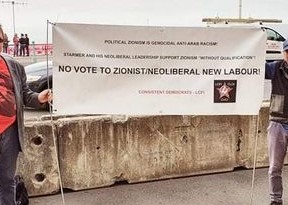
Our entryism came to an end when the Corbyn leadership was defeated by the Blairite right, through the sabotage of the 2019 General Election. Unfortunately, at that time the original leader of our British section, comrade Downing, changed his mind about our critique of Zionism and began denouncing what is now clearly the majority of the British group for ‘anti-Semitism’. He had been the focus of ferocious witchhunting and social pressure for several years and he vainly attempted bureaucratically to remain in his position as the leader of the British group. His splitting away was a tragedy, though his smaller group maintains an affiliation to the LCFI. But the bulk of the British section overcame this unfortunate split, and left Labour in good order when Starmer ousted Corbyn as leader in the Spring of 2020. As soon as we were able (in 2020 this was not possible due to Covid) we demonstrated with a banner outside the 2021 Labour conference with a banner reading ‘No Vote to Zionist/Neoliberal New Labour!’ making clear our break from Labour when an open Zionist racist became leader (see photo on front page of Communist Fight no 7, https://www.consistent-democrats.org/uncategorized/communist-fight-issue-7-available-now/). Despite the political problems we experienced – which are not unprecedented as anyone who knows the history of the Trotskyist movement will be aware, this is what principled entry-work looks like.
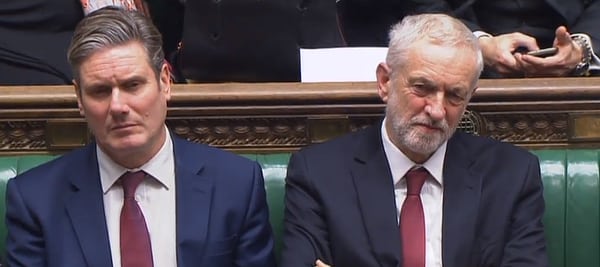
Another aspect of your internal polemics about the Labour Party strikes us as strange and un-Marxist. A difference of view, about the precise nature of the class contradictions in the Labour Party which seems to have been implicit and tenuous, is highlighted in your 2021 conference document thus:
“The reason the SL/B gave for supporting Corbyn was basically that the Blairites were qualitatively different from previous right-wing factions in the Labour Party. The SL/B presented the Blairites as if they no longer had the contradiction of having a bourgeois programme and an organic link to the working class but had a purely bourgeois class character despite being inside the Labour Party. This is simply false; Blair was not the first Labour leader wanting to separate himself from the working-class base of the party (which is different from being able to do so). The liberal bourgeois programme of Labour means that the tops are constantly driven into conflict with their working-class base, which constitutes both the source of their power and a shackle to their bourgeois ambitions.”
The main previous example of a Labour leader that ‘tried’ to separate himself from the Labour Party’s working-class base was Ramsay MacDonald, who exited from the Labour Party under fire into a coalition with the Tories and is reviled as the worst traitor in its history. However, the working-class base of the Labour Party has found it much more difficult to separate itself from Blairism, and there is a material reason for that. In the days when the industrial proletariat in manufacturing was the dominant social force, the political bureaucracy of the Labour Party acted as the agent of finance capital, which Lenin defined as the fusion of industrial and banking capital. With the massacre of manufacturing and the outsourcing of millions of jobs, it would be more correct to define today’s version of that bureaucracy as agents of financial capital, i.e. parasitic finance that has become far more autonomous from industrial capital in the classic sense. So instead of right-wing bureaucrats who embody the class-collaborationism of mass trade unions, in the mould of Ernest Bevin, Denis Healey, Peter Shore, Roy Hattersley, James Callaghan, etc, who were organically connected to organised workers (albeit often mediated by various CIA-funded ‘Labour’ fronts), today you have the likes of Starmer, Blair, Mandelson, and Labour Zionists like Streeting, Akehurst and the like, whose connections are with high finance, Hedge Funds, and rather often, the Israeli Embassy.
That is a material difference. It is also why in the period when the Labour Party really did command the loyalty of huge layers of organised workers as a political agency of finance capital, it was generally correct for Marxists to advocate critical support for it in elections. Trotsky, you might be aware, was scathing in the 1930s about leftists who refused to give electoral support to Labour. Today, when Labour in its death agony has a bureaucracy a considerable portion of who are simply open agents of financial sharks and privateers, the occasions when it is principled to give critical support to such parties are much fewer and far between. Formally, both these variants still represent a bourgeois workers party, and so vulgar ‘Marxists’ might think the same tactics should be applied. But your tendency avoids such questions by ignoring Trotsky’s writings on the Labour Party and critical support before WWII. Trotsky was scathing about this kind of ‘logic’ in In Defence of Marxism: ‘A is not equal to A’. Or as Heraclitus remarked, quite in the spirit of Marx’s dialectic, “It is not possible to step into the same river twice”.
By refusing to take sides in the ‘Chicken Coup’, which was a political class battle waged in the Labour Party by Corbyn’s base, and denouncing those in your own ranks who wanted to do so, you were again acting as pseudo-intransigent Shachtmanites – a left cover for the agents of financial capital who are actually seeking to destroy the working class element of Labour, which the most class-conscious workers seek to preserve as an expression of their own class interests. But if those trained by Robertson can give political support to Tories, then this kind of betrayal is not that different either.
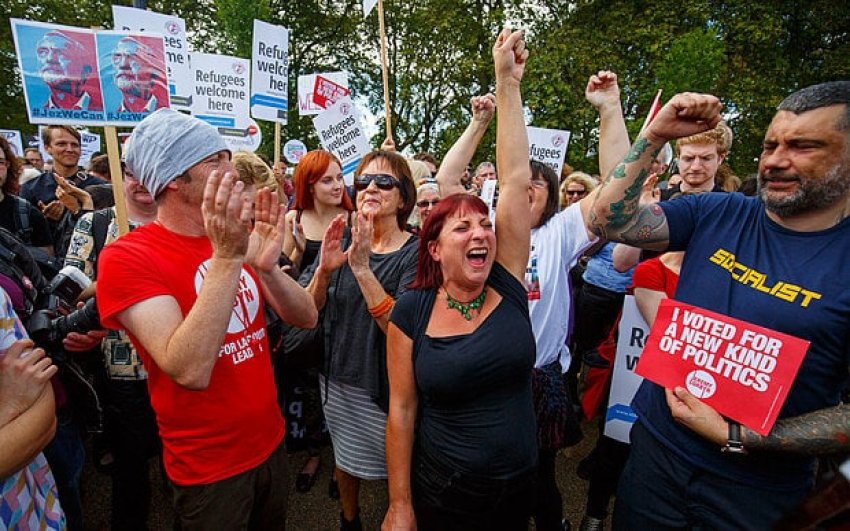
One other spurious piece of reasoning is the following formulation in your polemic against SL/Bers who were inclined to support Corbyn against the Chicken Coup was this polemic that against the idea that “driving the Blairites out would mean a step towards the proletariat no longer being subordinated politically to the bourgeoisie….”
Which logically means that it would be wrong to advocate driving the Blairites out of the Labour Party. Abstentionist nonsense. Even a quantitative move to the left if such an endeavour succeeded would result in more fertile conditions for those advocating “the proletariat no longer being subordinated politically to the bourgeoisie”- i.e. a qualitative shift. Such a split would likely be a step along the road to the real programmatic split we want. Otherwise, what’s the point in advocating driving the CIA-connected right-wing, or today’s Zionists, out of the Labour Party if “the programme of both wings of the Labour Party is bourgeois”, implying equally bourgeois? If it serves no useful purpose in class terms, there is no point. Trotsky said that centrism is ‘crystallised confusion’ and this strange and incoherent polemic is a case in point.
Now we come to two sets of questions related to what those in the old SL called the ‘Russian Question”, directly or indirectly: your polemic against the old International Spartacist tendency over Poland and the positions that it took in 1981 over Solidarność and its suppression through martial law in December 1981 by the Polish Stalinist regime of General Jaruzelski, as well as a broader polemic against the SL that is apparently embodied in your polemic in defence of Trotsky’s call for an Independent Soviet Ukraine against the old Spartacists who formally renounced this call in 1993.
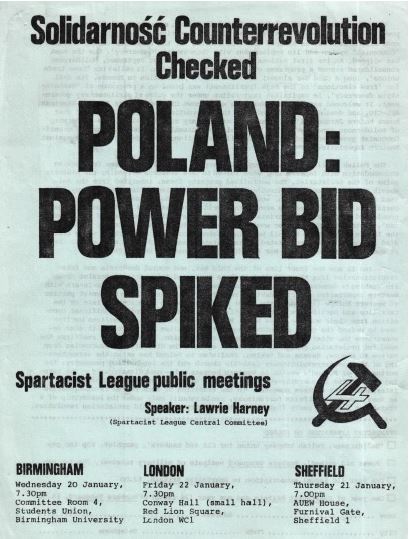
We consider that the first question embodies a question of principle, as laid out by Trotsky in a seminal point in his major polemic against the Shachtman-Burnham trend in the US SWP in 1939:
“We must formulate our slogans in such a way that the workers see clearly just what we are defending in the USSR, (state property and planned economy), and against whom we are conducting a ruthless struggle (the parasitic bureaucracy and their Comintern). We must not lose sight for a single moment of the fact that the question of overthrowing the Soviet bureaucracy is for us subordinate to the question of preserving state property in the means of production of the USSR: that the question of preserving state property in the means of production in the USSR is subordinate for us to the question of the world proletarian revolution.” (Trotsky, The USSR in War, from In Defence of Marxism, p21)
We do note your polemic against your political forebears over this, taking exception to the formulation they used in September 1981, to announce that, as its first Congress, held that month, the mass trade union Solidarność had consolidated around a programme of neoliberalism and capitalist restoration in the name of Western ‘democracy’. We also note that you appear to agree with them on the premise that apparently motivated the formulation that you denounce, because you say of the Stalinist bloc, in your document The Breakdown of U.S. Hegemony & the Struggle for Workers Power, that:
“By the end of the ’80s, the USSR and the Eastern bloc were in deep economic and political distress. The retreat of the Red Army from Afghanistan and the counterrevolutionary victory of Solidarność in Poland further demoralized the ruling bureaucracy in Moscow. After Moscow sold out the DDR (East Germany) and acceded to German reunification, it wasn’t long before it sold out the Soviet Union itself. The pressures of world imperialism combined with working-class demoralization from decades of Stalinist treachery led to the final liquidation of the gains of the October Revolution. By 1991 the international balance of class forces had decisively shifted in favor of imperialism at the expense of the working class and oppressed of the world. (https://iclfi.org/spartacist/en/68/breakdown, emphasis added)
Yet in you say of their call in September 1981 that:
“As the Polish and Soviet Stalinist regimes moved to stop Solidarność, the Spartacist tendency capsized Trotskyist defensism by declaring:
“If the Kremlin Stalinists, in their necessarily brutal, stupid way, intervene militarily to stop it, we will support this. And we take responsibility in advance for this; whatever the idiocies and atrocities they will commit, we do not flinch from defending the crushing of Solidarity’s counterrevolution.” (Stop Solidarity’s Counterrevolution, Workers Vanguard No. 289, 25 September 1981, cited in your recent article In Defense of Permanent Revolution—For Communist Leadership of the Anti‑Imperialist Struggle!, in Spartacist #68 https://iclfi.org/spartacist/en/68/permrev)
You condemn this formulation thus:
“That was a statement of political support to the Stalinist bureaucracy, utterly counterposed to mobilizing workers in the USSR and Poland to wrest political power from the Stalinists whose entire program undermined defense of both workers states.”
It seems to us that, though the formulation used is crude and provocative, it does not in itself amount to political support of the Stalinists. It does not call for any “idiocies and atrocities”, indeed it implies that it will support the Stalinists in a future military confrontation (at that point) despite such horrors. Though it had threatening overtones, which could be considered as a morbid sign of a Stalinophile bloodthirstiness in what was in fact a tragic situation, it did not formally break with the tenets of Soviet defencism. You continue
“As a ‘theoretical’ justification for its capitulation to Stalinism on the national question, the ICL repeatedly declared that self-determination and other democratic questions were subordinated to defense of the workers states, a ‘class question.’ To be sure, there are many historical examples of imperialist-backed forces raising the national-democratic banner as a rallying point for counterrevolution, as the Mensheviks did in Georgia during the Russian Civil War. In such cases, defense of the workers state is the primary need of the moment, although that does not erase the reality of national oppression and the need to combat it. Yet the ICL abused such history to reject the struggle for democratic and national rights in the workers states in toto. “
We would say that despite the provocative tone of the passage you criticise, it is important to be clear that in the Autumn of 1981, Solidarność had consolidated around a counterrevolutionary programme and was seeking to oust a Stalinist regime that was on the verge of collapse, and if it had done so, a counterrevolutionary regime would have been the immediate outcome. It was necessary to oppose that and, in the event that the apparatus of the Polish deformed workers state tried to stop that happening – as it did in December 1981 with Jaruzelski’s Martial Law, to side with those forces against Solidarność.
This seems (so far) to be the definitive passage that you have written about the Martial Law confrontation between Solidarność and the Stalinist regime in 1981. It has some ambiguities. On the one hand, it positively cites the precedent of Menshevik Georgia, which was forcibly ousted by the early Soviet power in 1921, led by Lenin and Trotsky. Yet it appears to attack that formulation of the Spartacists in itself as a “capitulation to Stalinism on the national question” for stating that “self-determination and other democratic questions were subordinated to defense of the workers states, a ‘class question.’” Yet of course, that was exactly the formulation the Bolsheviks used to justify the forcible Sovietisation of Menshevik Georgia. That is the ambiguity in the passage – it does not clearly state that, notwithstanding the enormous political gulf between the early Soviet republic in 1921, and the decrepit Polish deformed workers state in 1981, that element exists in common – the counterrevolution must be military stopped from gaining or holding state power.
If you are saying that despite taking a formally correct position on supressing the counterrevolutionary threat in 1981, the then-iSt’s brutal overtones in that passage reflected a barely hidden Stalinophile chauvinism, we would concur. As a current, we came to the conclusion while discussing our draft programme in 2020-21 that the basic Spartacist position on 1981 was correct, but that at the same time their propaganda was flawed by chauvinist and anti-working-class elements:
“Their response to the rise of Solidarność in Poland, once it became clear what the political thrust of the movement actually was, correctly was to highlight the developing pro-capitalist politics that were becoming dominant in the movement. However, their Stalinophile deviations manifested themselves in their propaganda that denounced the Polish working class in ways that resembled anti-union tirades from bourgeois politicians in capitalist countries. Polish workers were denounced for supposedly being too well-fed and the endemic shortages engendered by Stalinist bureaucratic misrule were blamed on the supposedly lazy and strike-prone Polish workers. While it certainly was correct by the end of 1981 when the Solidarność leadership were indeed driving to topple the Stalinist regime, to bloc militarily with Jaruzelski to prevent such a counterrevolution, the anti-union and anti-worker thrust of much Spartacist propaganda contradicted the pro-socialist thrust that should have permeated the revolutionary attitude: that we are for workers power, not capitalist restoration.
“Throughout the martial law period as Solidarność under Jaruzelski’s restrictions became more and more openly pro-capitalist and neo-liberal, and eventually called for a Polish Stock Market, the Spartacists fulminated against them while at the same time looking to ‘harder’ elements of the Stalinist regimes to fight the counterrevolutionary drift. So, there was a portrait of Poland’s Jaruzelski in their New York office. Around the same period, the Vietnamese Stalinist regime, whom Robertson visited and sought some kind of fraternal relations, as part of Đổi Mới also called for the creation of a stock market in Vietnam, and then began to implement its plans. The Spartacists were silent about this, though through their contacts with this regime they must have known about it.” (https://www.consistent-democrats.org/lcfi-draft-programme/)
It looks to us that your points about their chauvinism on the national question have some validity, but it is not clear that it was national oppression that drove Polish workers to support neoliberalism under the Solidarność banner any more than it was national oppression that drove many Russian workers to Yelstin’s neoliberal banner. It was despair at the evident bankruptcy and venality of Stalinist bureaucratic rule and the complete absence of a compelling perspective that could overcome it in a progressive direction, that drove many working-class people behind the fools’ gold of capitalist restoration.
It is highly doubtful that adapting to Polish national sentiment would have helped Marxists to overcome workers’ illusions in capitalism. It is true that the Hungarian revolution in 1956 was driven by an aspiring national communism, with genuine workers councils in major cities. In Hungary the national communists were brutally supressed, but in Poland they were allowed to take office in a controlled manner after some repression and proved just as bankrupt as their more conventional Stalinist former persecutors. The national-communists Gomulka, and then Gierek proved their bankruptcy, and paved the way for Solidarność. It was precisely their national-bureaucratism that undermined their own authority. We counterpose internationalism to that, not some kind of hybrid national-internationalism trying to feed off the sentiments that drove Solidarnośc, the various so-called ‘Popular Fronts’ in the Baltic states, etc.
The call for an independent Soviet Ukraine, or Poland for that matter is a perfectly appropriate way to seek to undermine national conflict involving perceived national oppression within a degenerated/deformed workers’ state. Obviously raising such a demand is a tactical question; it cannot just be raised independently of time and space – there must be some possibility of it being achievable when Marxists raise it, otherwise there is no point. In our view the old ICL contradicted themselves when they dismissed the possibilities of such a thing being reasonable. On the one hand they argued that:
“…in 1939 all tendencies of Ukrainian nationalism looked to Nazi Germany for support. There is little reason to believe that the demand for an independent Soviet Ukraine (which would be committed to the defense of Soviet Russia) would have found much receptivity among national-minded Ukrainians.” (Spartacist 49-50, Winter 1993-4, p13)
Then a few sentences later they cited evidence of the opposite:
“Events soon proved that Trotsky overestimated anti-Soviet attitudes among the Ukrainian masses. Many workers and peasants in the western Ukraine welcomed the Red Army occupation in September 1939, a fact which Trotsky himself emphasized in his polemics against the Shachtman-Burnham third campists. When the German Wehrmacht invaded the Ukraine in July 1941, they were to a certain degree welcomed as “liberators” by sections of the Ukrainian populace. However, the pro-Nazi Ukrainian nationalists – in part because of the extreme brutality and undisguised colonial character of the German occupation – were never able to gain a mass following.” (ibid)
It is peculiar that the ICL then equated Ukrainian national sentiment in that situation with “Anti-Soviet attitudes among the Ukrainian masses”. The fact that a significant part of the population could even consider welcoming an invading army as ‘liberators’ indicates considerable nationalist discontent. According to this rendering that was then rejected, and the opposite welcome subsequently happened in Polish Western Ukraine – the Red Army being welcomed because of the revolutionary changes it brought in its train. This showed, as clearly as any indicators are likely to, that national discontent with Stalinist rule co-existed with pro-Soviet sentiment in such a way that the demand for an independent Soviet Ukraine and indeed the revolutionary unification of Ukraine could have had considerable purchase if a significant force on the ground had been present able to fight for it.
The ICL’s own attempt to justify the renunciation of Trotsky’s demand, understood properly, backs Trotsky’s case. We would observe that it is peculiar that they only renounced Trotsky’s demand in 1993: in 1981 and through the whole period of the collapse of Stalinism they at least formally stood with Trotsky on this. It is obvious to us that this change was a symptom of a further move away from orthodoxy by the ICL after the collapse of Stalinism. It does not invalidate opposition to Solidarność. Since such pro-Soviet sentiments as the ICL noted in Ukraine at the start of WWII were simply absent in Poland in 1981.
We hope it is not the case that the new ICL is in the process of retrospectively embracing the various forms of East European nationalism that played a major role in the destruction of the deformed workers states of Eastern Europe. We suspect this is a smear from the semi-unreconstructed Robertson cultists of the Norden group, but some of your ambiguity on this is a cause for concern. Aspects of your position on the Ukraine war, and on China regarding the Uighurs, give some credence to such misgivings.
We do not consider China to be a deformed workers state any longer. We consider it belongs to a similar new category of deformed bourgeois state as Russia does. This is a very important concept as there are still programmatic reasons for defending this new type of non-imperialist bourgeois state against imperialist attack and internal overthrow by imperialist-proxy forces, despite the liquidation of the actual proletarian dictatorship. Even though they cannot simply be equated with semi-colonies, they are more powerful than that, they are not imperialist and are still the object of class-based hatred from imperialism, which makes them in a similar way oppressed countries that we are doubly duty-bound to defend by the method of the AIUF, as discussed earlier.
Not least because, in the absence of a tested state apparatus proven in life to be dedicated to defending capitalism arms in hand against the masses, it might still be possible for the counterrevolutions to be reversed by the masses without a fully fledged civil war. Recall that Marx himself considered that a peaceful overthrow of capital was at least theoretically possible in Britain in the mid-19th Century, before such a hardened bourgeois state had consolidated there. It is probably more conceivable for that to happen in today’s Russia and China than at that point in British history. This is also the real reason for the eruption of today’s imperialist Cold War against Russia and China.
For us, deformed workers states were deformed by economic backwardness and lack of productive capacity due to isolation and imperialist encirclement, where to administer the limited means something akin to, in Lenin’s words in State and Revolution, a “bourgeois state without the bourgeoisie” emerged out of necessity to hold the society together. With the prolonged isolation of Soviet Russia and then the USSR, this bourgeois social excrescence within the workers state was able to politically expropriate the proletariat in their own state. This political expropriation necessitated a supplementary political revolution to return political power to the proletariat.
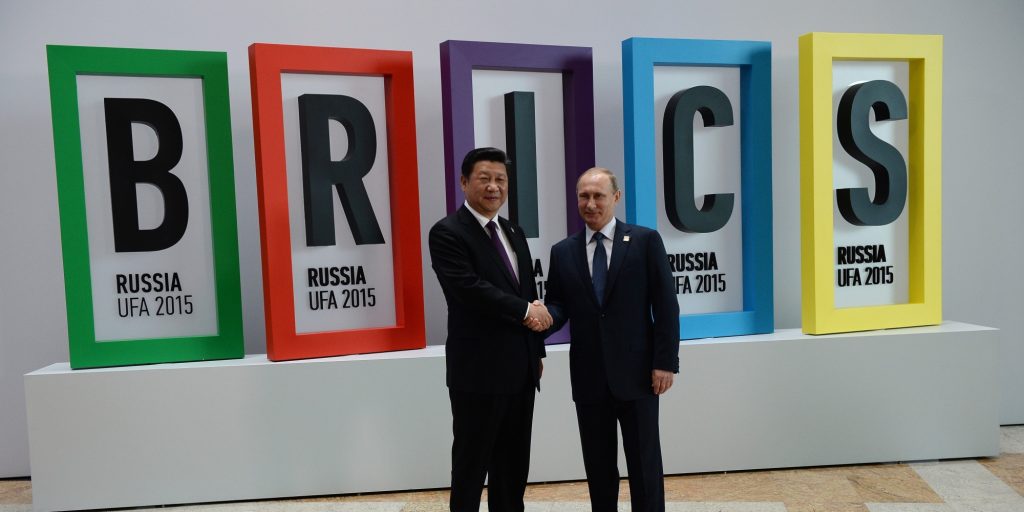
However, with the counterrevolution in the degenerated workers state of the USSR, and the giant deformed workers state that was China, the bourgeois states that resulted faced the opposite deformation – productive forces, and a state apparatus intertwined with them, that were developed massively under the embryonic beginnings of a higher mode of production than capitalism. It is true that these deformed workers states did not succeed and could not because of their isolation from the productive capacity of the imperialist world, in achieving the lower stage of communism, or ‘socialism’ as a fully developed mode of production. But they achieved massive expansion of their productive forces under a planned, socialised economy. The mode of production that operated under that situation was not socialist in the complete sense, but it was still a transitional form struggling, even if ultimately in vain because of the bourgeois deformations, to achieve that higher mode of production. It was therefore already somewhat higher in its developmental capacity than declining capitalism, as Trotsky noted in the Revolution Betrayed when he wrote that the Stalinist regime:
“… has not yet touched the economic foundations of the state created by the revolution which, despite all the deformation and distortion, assure an unprecedented development of the productive forces.” (Once Again: The USSR and Its Defence, https://www.marxists.org/archive/trotsky/1937/11/ussr.htm)
That unprecedented development of the productive forces took place under a mode of production, however embryonic and however stunted by the deformations of those workers states, more advanced than capitalism. And that development took place for several decades. It cannot simply be rolled backward automatically by the counterrevolution. On the contrary, those post-capitalist aspects of those society deform the counterrevolution, limit its sweep, and make those states into formations that imperialism itself does not consider reliably capitalist, or to be trusted at all. We sum up this issue theoretically in the following passages in our statement on Marxism and the Post Counterrevolution Cold War, linked to earlier:
“The existence of a workers’ state, however deformed or degenerated, means that that state has already begun the transition to a higher mode of production, communism. Even if the transition is blocked by social backwardness, imperialist encirclement and the monopoly of power of a bureaucracy that opposes and attempts to sabotage the world revolution and thereby the completion of the transition, the transition has begun. The train has left the station, even if it is stalled only a few hundred yards down a track that is many miles long. It is extremely heavy, and still very difficult to simply drag back to its starting point and beyond. (https://www.consistent-democrats.org/uncategorized/lcfi-statement-marxism-and-the-post-counterrevolution-cold-war/)
Furthermore:
“After the expropriation of the bourgeoisie through revolutionary processes and once the post-capitalist process of economic monopolization, centralization and planning has been unleashed, it is no longer possible to return to the previous conditions of the pre-capitalist capitalist mode of production. This generates a series of partial achievements of the society in transition. The restoration of capitalism cannot permanently and completely destroy all of the achievements of the society in transition created by the revolutionary process. The history of the last 30 years has revealed that it is much more difficult to destroy these revolutionary achievements than previously predicted, including by the Trotskyist movement. This substantially changes capitalism in Russia and China and has produced new types of what we could call ‘deformed capitalist states’, which are evidently not imperialist. The capitalism that has been restored is weak, not so much in the face of its imperialist tormentors and enemies, but in the face of the massive post-capitalist ‘deformation’ in its ‘capitalist’ economies. Finance capital and the systematic transfer of wealth from less developed economies played no role in their post-capitalist development, and there is no material reason for this to happen now. (ibid)
And yet more:
“Within a social formation, more than one mode of production can coexist, in an unequal and combined way. In this case, the post-capitalist mode of production coexists with ‘elements’ (of an ‘invading socialistic society’) of deformed proletarian dictatorships, which are, at the same time, the germ of a future socialist mode of production. It is important to remember, that in much of the semi-colonial world, capitalism coexists with a pre-capitalist heritage, and China and Russia coexist with a post-capitalist heritage.
There is a classic, dialectical quality in the reality that the outcome of the counterrevolution that destroyed deformed workers’ states that existed for several decades, should be a form of capitalist state that itself embodies major deformations and modifications that stem from those decades without capitalism, to the extent that imperialism still perceives them as a major threat to their rule and their hegemony.
Such deformed capitalist states can be of heterogenous types, depending on the specifics of their history and origins, and there is no pre-ordained ideological banner which is imperative for their ruling political trends to necessarily uphold. Though China is ruled by the Communist Party, whose ideology is a capitalist bastardisation of what was Stalinist ‘Communism’ but really isn’t anymore, Russia is ruled by the centre-right bourgeois (sui-generis) Orthodox Christian President Vladimir Putin, leader of the hegemonic and highly popular ‘United Russia’ party whose authority stems largely from economic programme and practice, which have tangibly and arguably hugely benefited most Russians since the end of Yeltsin’s carnage.” (ibid)
We could go on, but these are the most theoretically substantial parts of our analysis, which we suggest you read in full.
We consider this analysis of China in particular to be more consistent with the views of classical Trotskyism than the continued adherence to the theory that China remains a deformed workers’ state upheld by yourselves, both wings of the former IBT, by Norden’s tendency, and indeed by quite a few other Trotskyists. It is obvious that capitalism in China was restored from above by the Chinese Stalinists in the same period in which it was restored in the USSR, or rather slightly afterwards, in late 1992, with Deng Xiaoping’s Southern Tour. The possibility of such restoration from above was accepted by the ICL, the Nordenites, and much of the IBT. Regarding the August Coup of 1991 the ICL considered that the objective of the Yanayev-led coupists was a gradual, controlled capitalist restoration from above, as opposed to Yeltsin’s shock treatment. The Nordenites were within the ICL at that point and have never dissented from that. It was Bill Logan, within the IBT, who put forward the view that the Yanayevites were at that point resisting capitalist restoration. We think at that point he was right, though he has no monopoly of wisdom either as he is now the author of the IBT’s dreadful position that Russia has now become imperialist, which we completely reject. But the point is that theoretically, the idea of a controlled capitalist restoration from above is not outside the realms of possibility for Trotskyists. And China now has more billionaires than the US, though they are far behind the wealth of the US billionaire class. Including the General Secretary of the CCP, Xi Jinping, whose net worth is $1.2 billion according to Forbes.
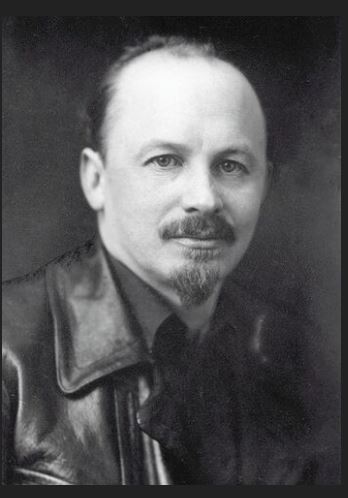
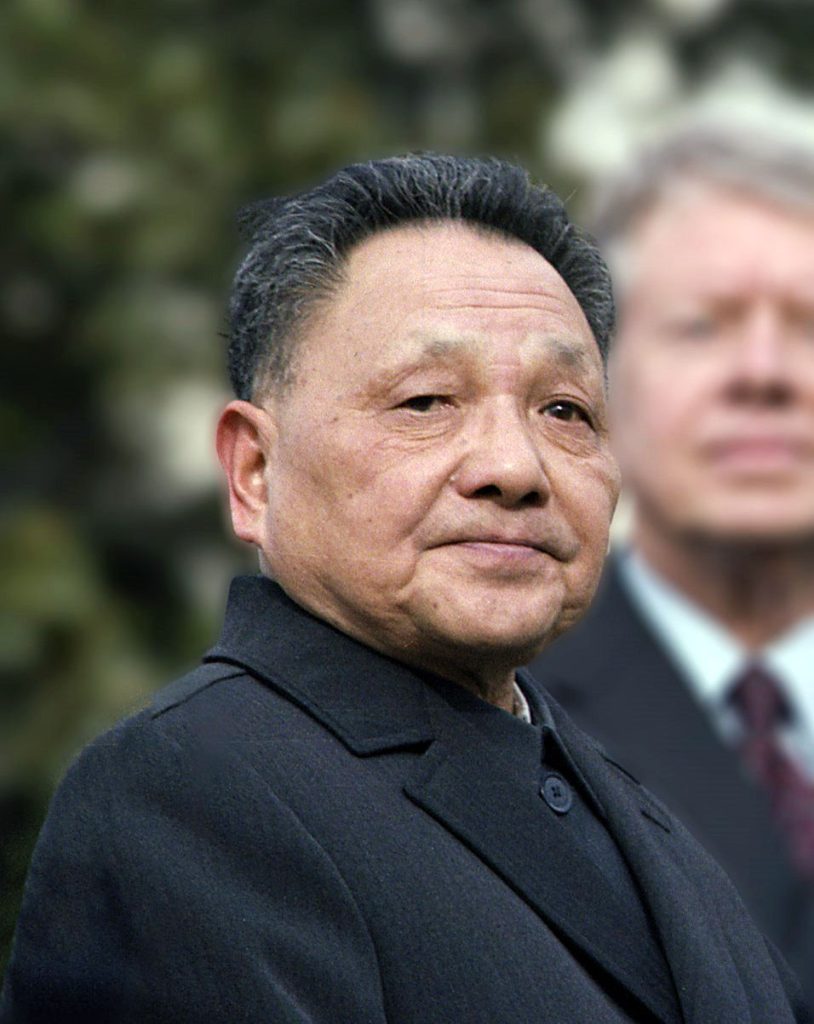
Relatedly, the idea that ultra-Bukharinist economic policies could be pursued by the bureaucracy of a deformed workers state for more than 40 years since Deng Xiaoping began that change around 1978, without a capitalist restoration of some sort, completely contradicts Trotsky’s understanding of the threat Bukharin posed to the Soviet workers’ state. Trotsky in the late 1920s considered Bukharin’s policy of “building socialism at a snail’s pace” through a deepened NEP, or Neo-NEP, bolstered by the call “peasants enrich yourselves” to be an immediate danger to the existence of the workers’ state. When Stalin broke with Bukharin and began the programme of collectivisation, Trotsky gave a degree of critical support to Stalin’s “turn” against Bukharin, to avoid the danger of counterrevolution. Yet Bukharin’s calls for the kulaks to enrich themselves was mild compared to Deng’s bald statement that “to get rich is glorious”, which was both urban and rural in its context and resulted in a massive growth of a new capitalist layer. If Bukharin’s economic policy represented imminent counterrevolution at the end of the 1920s, how could China, which has implemented four decades of market policies far more radical than Bukharin’s, still be a workers’ state?
However, as emphasised above, we defend both Russia and China against imperialist attack and any pro-imperialist “colour revolution” that would obviously be aimed at deepening the counterrevolutions in both to bring them into line with imperialist aims, perhaps by engineering the fragmentation of both.
We have no objection to the defence of China against imperialism and attempts by imperialism to foment pro-imperialist regime change in China. We are with you on that. We do have serious misgivings about some of your recent remarks about the Uighurs, and the need for Trotskyists to take up their cause against the Chinese government. Given the totally false and poisonous smears about Chinese ‘genocide’ in Jinjiang, this is something that should be handled with extreme caution. While we are opposed to any policy of Han Chinese oppression or inequality against Uighurs, Tibetans, or any other minority population, given the history of imperialism seeking to use such questions against China, both when it was a workers’ state and still today, we think Trotskyists should focus their fire on defending China.
We are also critical of your polemic against the CCP for its Covid policy of the use of lockdowns and widespread vaccination to control the pandemic, which was extraordinarily successful especially since the pandemic appears to have had its starting point in China. We note that even the most severe estimates from external sources of the number of Covid deaths in China puts it at around 700,000 – around half that of the United States. China has approximately four times the population of the United States. Which means that China’s effort at combatting Covid was at least eight times more effective than that of the United States. We consider that in such conditions as that of the Covid pandemic, any policy must be judged by its efficacy in saving working-class lives. Your tailing of Covid-denialist forces following in the wake of Trump was completely wrong. Indeed one concrete example of our defence of China against imperialism is our denunciation of the opportunist imperialist attempts to exploit anti-lockdown sentiment in China to foment a colour revolution (see https://www.consistent-democrats.org/uncategorized/imperialists-try-to-exploit-covid-safety-measures-to-foment-colour-revolution-in-china/)
We are also critical of your neutral position regarding the Ukraine war, which we consider to be an imperialist proxy war whose strategic objective is regime change in Russia and its dismemberment as laid out in the well-known Brezinsky plan. We are firmly on the side of Russia in the war over the South-East of Ukraine, where real national oppression is being dealt out to the half of the country that speaks Russian as its native language. We note your points about Great Russian chauvinism and the early efforts of Lenin and Trotsky to combat it when Stalin and Ordzonikidze treated Georgian communists with contempt in the aftermath of the justified Sovietisation of Georgia in 1921. We are hostile to those expressions of Great Russian chauvinism and also anti-Semitism that Trotsky and others criticised that were part of the degeneration of the revolution under Stalin. This is elementary.
But it is not the only political problem that the Stalinist regime in Russia have bequeathed, is it? To be sure, Stalin’s deportation of Crimean Tatars and also Chechens to Central Asia was appalling. But what of Krushchev’s gifting of Crimea, with its mainly Russian population particularly after Stalin’s Tatar action, to Ukraine in the early 1950s? That was also irrational but was hardly an act of Great Russian chauvinism. That has laid the basis for serious problems today connected with the Ukraine war, and Great Russian chauvinism is not in play here. In any case, Great Russian chauvinism is a survival of the fact that Russia, prior to 1917, was an imperialist country (though the most backward of imperialist countries). The Russian imperialist bourgeoisie had its class rule torn out by the roots in the aftermath of the October revolution, never to return.

Bourgeois Russia today is not imperialist, in fact it is the target of one of the most virulent forms of imperialist racism, which no longer drapes itself in the tawdry flag of ‘democratic’ anti-Communism and feigned sympathy for the poor Russians suffering under ‘Communist’ tyranny. Now you see bans on Russian cultural artifacts from the works of Pushkin and Dostoevsky to past images and awards given to historical personages like Yuri Gagarin, to bans on sports teams, art exhibitions, you name it. This is because Russians (and this is beginning to happen to Chinese people as well), are seen as a disobedient national group, organically subversive and hostile to the imperialist world order. The imperialists are aware of the considerable popular support for Putin – his 87% of the popular vote in the Presidential election earlier this year was matched by Western opinion polling in Russia that gave him similar approval ratings. But this has been known for years. Modern Western imperialist Russophobia is like Hitler’s hatred of Jews because he and his followers believed that Bolshevism was organically Jewish. Russians today are an oppressed nation on an international level, despite the power of Russia as a state, and any Marxist material on the Russian question has to reflect that.
The Ukraine war is a proxy war waged by imperialism and NATO, and Ukraine plays no independent role whatsoever. Though its far-right leadership are puppets, the most you can say it that that they are greedy puppets, always demanding more weapons and resources from their sponsors. They can do this because they know that their war is a class project for their imperialist sponsors. Your contention that this is a national conflict between Russia and Ukraine and the imperialists are not decisively involved is a complete travesty of the facts. We are not opposed to Ukraine’s right to exist as a nation, but we do not support its ‘right’ to act as a proxy and a trojan horse for NATO and the United States. You contradict yourself on this, when you write:
“Should workers side with Russia?” Some on the left believe that since Russia is challenging the imperialists it should be supported in its war. This is a capitulation to Great Russian chauvinism. Russia is not at war with the imperialists but with the Ukrainian government. The proletarian strategy to fight imperialism in Ukraine and Russia lies in common revolutionary struggle of Ukrainian and Russian workers, not in supporting the designs of the Kremlin…” (https://iclfi.org/spartacist/en/67/ukraine, emphasis added)
And yet you write earlier in the same article:
“This war is fundamentally about whose sphere of influence Ukraine is under…”
So, it’s not about Ukraine per se, but about which bloc it is part of. This admission completely negates your point that “Russia is not at war with the imperialists but with the Ukrainian government”. If the Ukrainian government is fighting “not to liberate Ukraine but to further enslave it to the NATO/EU imperialist powers, to which it has been bound since the 2014 U.S.-backed coup” (which is accurate) then it is precisely a war between NATO and Russia. You cannot have it both ways. No matter how many (irrelevant) bits of verbiage you insert about the terrible oppression of Ukraine by Putin, you cannot reconcile this contradiction. It renders your policy incoherent.
The only reason the NATO powers have not dared to openly send their troops as an expeditionary force to fight Russia in Ukraine, is fear of Russia’s massive nuclear arsenal, which is now more powerful than that of the United States. We are glad that it is so powerful, the counterrevolution in Russia has proved impossible (so far) to decisively consolidate and this means that Russia, with China now the most powerful part of the non-imperialist global South, is still providing protection for the peoples of the non-imperialist world from untrammelled imperialist domination.
Your call for workers in Russia and Ukraine to “turn the guns around” and jointly overthrow their capitalist rulers in this context is a capitulation to imperialism. Just as much as it would have been if some pseudo-left tendency in the Iraq wars of 1991 and 2003 had called on Iraqi workers, Kuwaiti workers, American and British workers, to “turn the guns around” and jointly overthrow their “capitalist rulers” (they are all capitalist rulers, right?) Or perhaps you should call for Israeli workers and Palestinian workers not to “fight” each other and instead “turn the guns around” against their “capitalist rulers” (again, they are all capitalist, right?) Psuedo-leftist verbiage does not prettify a capitulationist policy before imperialism one iota.
This phrase, “capitalist rulers” hides the fact that one side in this war is imperialist, and one side is not. It’s a weasel phrase to avoid the necessity of an Anti-Imperialist United Front with non-imperialist Russia against a NATO proxy. Again, you admit Ukraine is a NATO proxy when you write “The Ukrainian government is fighting not to liberate Ukraine but to further enslave it to the NATO/EU imperialist powers, to which it has been bound since the 2014 U.S.-backed coup.” This cannot be emphasised enough. As Trotsky wrote in 1937:
“Nevertheless the difference between England and India, Japan and China, the United States and Mexico is so big that we strictly differentiate between oppressor and oppressed bourgeois countries and we consider it our duty to support the latter against the former.”
Notwithstanding the economic and social development of China and Russia since under deformed proletarian dictatorships since, this applies to both Russia and China. Indeed, the post-capitalist deformations of the ‘bourgeois’ states of Russia and China provide additional reasons why such an Anti-Imperialist United Front is obligatory. It would be as obligatory with China if a similar proxy war in Taiwan broke out in the future as it is today with Russia over Ukraine. Frankly, your claims to be championing the supposedly “independent” action of the proletariat in refusing to call for the proletariat to take sides in this war, sound like Hal Draper.
In an exchange with the Bolshevik Group of Korea you wrote:
“This brings us to the nature of the conflict, which is not fundamentally a national war for the liberation of Russian minorities, but first and foremost a proxy war between NATO and Russia over whose influence will predominate in Ukraine. The expansion of NATO influence to Ukraine, a country Russia considers to be in its sphere of influence, has been at the root of the conflict from 2014 and beyond. From February 2022, the war aim of Russia has not been to simply support the Donbass republics but to ‘denazify’ and ‘demilitarize’ Ukraine. This clearly implies installing some kind of pro-Russian regime in Kiev. It is not a democratic right of Russia to change the regime of a foreign country, even if this regime is backed by imperialism. How does the march of the war not fall in line with what you yourselves warned against at the outset of the conflict?” (https://iclfi.org/spartacist/en/2024-kbg-letter, emphasis added)
So once again, you admit that this is not a war between Russia and Ukraine, as you originally asserted, but a proxy war between Russia and NATO about whose “influence” will “dominate” in Ukraine. You apparently have no preference between the two. How is this compatible with defence of Russia, as a non-imperialist country, against NATO imperialism? And yet you sagely lecture “It is not a democratic right of Russia to change the regime of a foreign country, even if this regime is backed by imperialism”.
So imperialism, for its own reasons, initiates a coup in a neighbouring country, using Nazi forces that openly proclaim their adherence to the Hitlerism that in a previous invasion of Russia from the West which resulted in the deaths of millions of Russian-Jewish USSR citizens and tens of millions of ethnic-Russian USSR citizens, and actively persecutes Russians and Russian speaking Ukrainians! And yet Russia has no “democratic right” to use force to remove that foul imperialist puppet regime from power? How is that remotely compatible with defence of Russia against imperialism?
And just before that, you wrote:
“While there was an armed uprising in support in Donetsk and Luhansk following the Maidan coup, this was not the case in the other regions which Russia now claims. At the very least, the sentiment in these regions is contradictory. Even if one is to believe that there was no manipulation of the 2022 annexation referendum results—which would indicate blind faith in the Kremlin—it is impossible to deny that these referendums only took place in the Russian-occupied parts of these territories—in which much of the population has been displaced—and cannot be considered a clear representation of popular sentiment. Even if Russia does not occupy all of Ukraine, it aims to occupy large portions of territory whose prewar population did not want to be part of Russia. Let’s be clear, comrades: Russia’s considerations are first and foremost strategic; it is not elaborating its military plans according to the democratic aspirations in Ukraine.” (ibid)
We note you don’t mention the terrible massacre in the Odessa Trade Union House, which was a clear indication of mass discontent far beyond Donetsk and Lugansk, which the regime drowned in blood. So, try and organise some kind of democratic expression in a war of attrition that had been prepared by imperialism for eight years previously with massive fortification of conquered territory in the mainly Russian-speaking sections of Ukraine. You don’t say that the population of some of these areas has been forcibly displaced by Nazi terror. The Ukrainian Nazis don’t respect the result of the Crimean referendum either – they regard the fact that the overwhelmingly Russian Crimean population voted to join Russia as a license to bomb and murder that civilian population. And there have been no elections in Ukraine since the SMO started – Zelensky’s presidential term has clearly expired. Apart from the fact that he is waging a brutal war against many of those in the Donbass and other Russian-speaking parts of Ukraine who originally voted for him because of his mendacious promises of “peace.” Your attack on those who defend Russia over this as expressing “blind faith in the Kremlin” has a bad taste of Russophobia implicit in it. In our view clearing out Nazi terrorists from the government of Ukraine is a “democratic aspiration” in itself.
There is no suggestion from Russia that Ukraine will not be allowed to exist as a nation once the Nazi regime is destroyed, though it will become a smaller nation of mainly Ukrainian speakers. The most that has been said by some Russian nationalists is that if ‘errors’ had not been made in the past, Ukrainian would have withered away as just a dialect of Russian, and the nations would have merged. We consider that unlikely and utopian, but it is not a suggestion that Ukraine today should seek to exist. The Russian Ministry of Education has mandated the teaching of Ukrainian in schools in the new Donbass territories, unlike the Ukrainian regime, which has since 2014 repeatedly attempted to suppress the teaching of Russian in schools.
What’s amazing is that unlike Bill Logan’s International Bolshevik Tendency, you don’t regard Russia as imperialist. If you did, at least your injunctions to “turn the guns around” on both sides, and militant refusal to take sides, would make sense. But you deny that Russia is imperialist. If Russia is not imperialist and is involved in a war against imperialism, even it is waged “by proxy” (because the imperialists fear Russia’s nuclear capabilities) then the application of the AIUF is a question of principle for Trotskyists.
Just two other matters we would express agreement with you on. We agree with your energetic but critical support for the Party of Socialism and Liberation (PSL) in the current US election campaign. This is a welcome break from the SL’s previous abstentionism, particularly since they renounced running for executive offices themselves.
We also agree with the aspiration of yourselves to intervene in trade unions using the Transitional Programme itself as a basis. We note that the SL’s practice of creating caucuses in various unions based on a variation of key transitional demands was a ruse to get around McCarthyite anti-communist rules which forbade open activity by a communist party. We do suspect that their activities were often marred by the SL’s sectarian vices, and note that dissident Spartacists, such as the BT’s Howard Keylor, were often more effective in carrying out such work as the SL itself. So, we share your aspirations on this, even though our forces are inadequate.
We hope this letter, with its mixture of agreement and credit when deserved, and strong disagreement and critique when merited, will provoke serious political thought and reconsideration of key questions by yourselves. We do seek principled regroupment through open polemics of this type, and our objective is the creation of a new International to replace the mass Communist International, whose number “Fourth” or “Fifth” is not in itself a principled question. We do seek debate and discussion with your tendency about the above with a view to principled regroupment, therefore.
Yours fraternally
For the Liaison Committee for the Fourth International

The notes for this presentation (26th May) are now available to read, and the presentation and discussion are also available to listen to as a podcast.

The notes for this presentation (28th April) are now available to read, and the presentation and discussion are also available to listen to as a podcast.

The notes for this presentation (7th April) are now available to read, and the presentation and discussion are also available to listen to as a podcast.
